#asksfullofsugar
Note
Hi! Where do you think Alastor's arc is going? Redemption or villainy?
Hi!
Thank you for the ask, I loved watching Hazbin Hotel and I am happy I can write for the series :)
As for now, I think Alastor will spiral and hurt Charlie very badly, but he will eventually redeem himself (probably in a key moment). That is because Alastor is framed as Charlie's Jungian shadow.
What is the Jungian Shadow?
According to Jung, the shadow is what a person represses, both positive and negative. So, it can be one's violent tendencies, but also one's potential and energy. It really depends on the person.
So, why does Alastor fit the Shadow Archetype? Well, first of all:
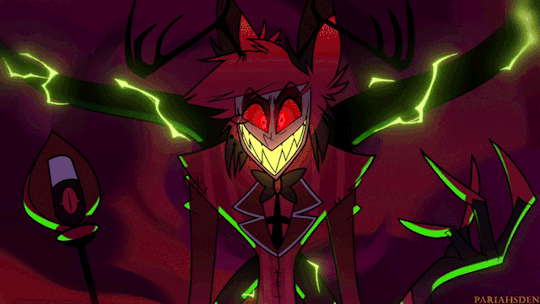
Alastor's powers make use of shadows. Not only that, but Alastor's own shadow is very expressive and shows the demon's repressed feelings. In other words:
On the one hand Alastor embodies the shadow, in the sense he represents what Charlie refuses to face
On the other hand Alastor himself represses his emotions behind a smiling face:
Alastor: Just because you see a smile, don't think you know what is going on underneath. A smile is a valuable tool, my dear. It inspires your friends, keeps your enemies guessing and ensures tha no matter what comes your way, you're the one in control.
This is a good characterization for a jungian shadow because the shadow grows stronger and more dangerous, when it's ignored. So, the most one refuses to face their feelings, the most these feelings fester and grow powerful and dangerous. This fits Alastor both when it comes to others and to his own character:
He takes advantage of an emotional unstable and vulnerable Charlie to strike an abimguous deal with her. Similarly, he uses Husk's gambling addiction to steal his soul. He uses people's weaknesses an unsolved problems to take over.
He suffocates his feelings, which symbolically manifest in his powerful shadow-tentacles. His design and abilities are representative of his psychological coping mechanism, which is nothing, but repression.
As written above, though, the Jungian Shadow can be both negative and positive depending on what one hides. This duality is shown in Alastor's two roles in Charlie's arc:
He is a demonic archetype (even moreso than Lucifer, the titular devil), as he waits in the shadows for a chance to manipulate Charlie
He is an evil mentor, as he genuinelly likes Charlie, sees her potential and wants to guide her towards greatness:
She's filled with potential that I could guide
This isn't a contradiction, but complexity. Alastor is chaotic and mixes negative traits and intentions with positive ones. Just like what people repress can be both bad and good, usually at the same time.
This is clear when it comes to the Princess of Hell:

Charlie to Alastor: What's that you said about smiles?
Charlie is similar to Alastor in how she represses herself behind her pollyanna persona and her smile. This doesn't mean she is faking her altruism and generosity, but that she is using these traits to hide something else:
Lute: The only reason you're still here is that Daddy gave you and your Hellborn-kind a pardon from an exorcist's blade. How does that feel? To know how little you matter.
Deep down, Charlie invests herself in the Hazbin Hotel project because she wants to matter. She feels powerless and unimportant, as a result of her parents' neglects and of Hell's difficult situation.
So, our protagonist has strong self-issues that she refuses to face:
Husk: Princess is a bleedy heart who wants to solve everybod else's problems, 'cept her own.
That said, this isn't the only thing Charlie represses. The Princess of Hell hides:
Every negative emotions she feels, like her self-hate or her anger at Vaggie for hiding her true identity:
Rosie: How does that make you feel?
Charlie: Just... angry? Because we share everything! Because she always supported me, and my ideas, and now I don't know whether or not that was just more of the lies... Oh no, that's a horrible thing to think! Do I think that? Yes! No? Kinda?
Her most violent and aggressive side, which makes so she is unable to make full use of her powers:
Vaggie: Well, I mean... You're the princess of Hell, but you don't really use the power that comes with that. Mybe you can, I don't know? Command a little more... authority.
Charlie: But that's so mean.
In short, by repressing her negative feelings, she also represses her potential. It is only by facing herself as a whole, that she can fully grow and bloom into her most powerful and complete self:
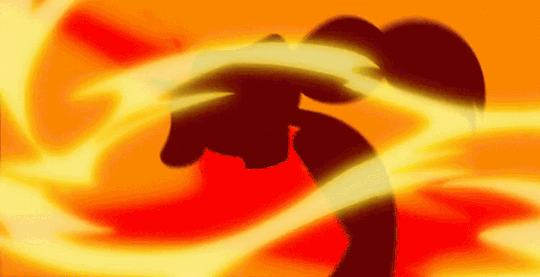
This is made clear in Charlie's quest in Cannibal Town. There, our girl is at her lowest, but she is pushing herself forward for the sake of her loved ones. She is trying to imitate Alastor by smiling, even if she is sour inside. However, things do not go well and it is only through her heart to heart chat with Rosie, that Charlie is able to pull herself together and inspire her people. Symbolically, she gets through them not with a 100% optimistic song like "Inside of every demon is a rainbow". Rather she opens her speech, by showing vulnerability and honesty:
It's a feeling like a rumbling in your gut
That you could finally be faced with
A billion needy faces
I guess what I mean to say is
For the first time in my life
I might have to be ready for this
Ready to be the one who's leading from the front
Gotta come into my own
Gotta come into my throne
Gotta take charge and defend my only home
And although I kinda feel unsteady
Now I need to be ready for this
She affirms who she is and her willingness to grow into herself:
For the first time in my life
Maybe I can be ready for this
I can be the marshal leading the parade
I can come into my own
And I think I've always known
My destiny could never be postponed
When Adam brings the battle here
I must appear like I'm ready for this
So, it is only by tapping into her own shadow that Charlie can be successfull. It is through expression and not repression that she can reach her goals.
What about Alastor?
He is the same, but so far he has been refusing to open up to others:
Angel: He's been here a while and he's still a big, creepy mystery.
That said, his time at the Hazbin Hotel has had an impact on him. He is forced to deal with others without killing them:
Vaggie: Pentious's eggs are all over the place. I need you to get rid of them. (...) Humanely!
He is shown cutting ties with a poisonous friend:
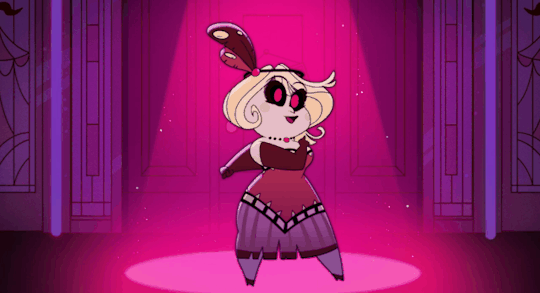
He openly admits he likes the people of the hotel:
Alastor: Ah, an enjoyable collective to be around. I admit one could get accustomed.
However, he still refuses to openly show vulnerability and ends up like this:
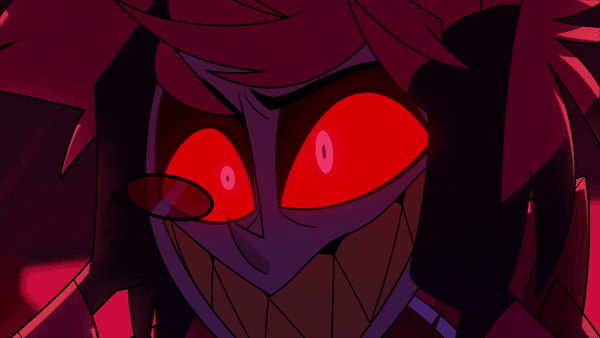
Let's highlight that Charlie and Alastor are foiled in The Show Must Go On song.
Both stand in the ruins of their homes/dreams.
The Hotel:
I took a hotel, and I destroyed it
I know I could have done better
Better, instead of letting you down
The Radio Station:
This place reeks of death
There's a chill in the air
And I barely escaped being killed by a hair
And both decide not to give up and to keep pursuing their objectives. However, Charlie is framed positively, while Alastor negatively. Why?
Charlie sings about her feelings openly and is supported by her father and found family:
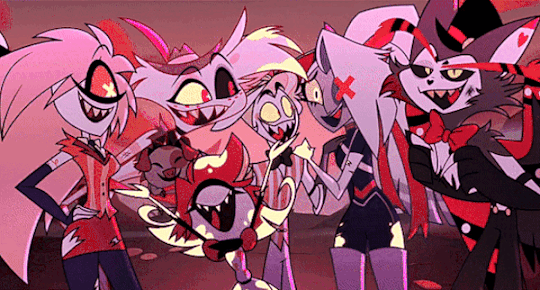
Alastor sings about his pain privately and even then he barely shows his desperation before going back to his villanious mask:

Symbolically the moment Alastor reunites with the Hotel Crew, he sings:
And we're doing it with a smile!
He is back in control of himself, ready to hide everything behind his neverchanging smile.
So, Alastor is both Charlie's negative foil and Jungian Shadow. As her negative foil, he is bound to spiral. As her Jungian Shadow he is bound to be saved. Why is that so? Two reasons.
The Jungian Shadow can't be killed, but needs to be integrated with.
The main themes of the series are redemption and love, so it is improbable that Charlie won't help the person, who co-founded the hotel with her.
If anything, it seems that our princess is progressively asked to forgive, inspire and see the good in more and more complex cases.
It starts with Angel, who willingly stays at the Hotel. It goes on with Pentious, who infiltrates the Hotel, but makes no real damage. Then Lucifer, whom Charlie loves, but that has been absent from the majority of her life. Finally, Vaggie, who breaks Charlie's trust.
Each conflict Charlie has challenges her in a different way and helps her discover herself and grow. She is bound to meet new struggles when Lilith becomes a broken pedestal and finally when Alastor betrays or hurts her. Still, she is going to forgive and to understand them.
Charlie is going to see the good in Alastor and to better understand herself as a result. As a matter of fact Charlie's journey is one where she is slowly discovering a world, which isn't black and white:
If Hell is forever, then Heaven must be a lie
If angels can do whatever, and remain in the sky
The rules are shades of gray when you don't do as you say
When you make the wretched suffer just to kill them again
Just like people aren't black and white. Just like she herself isn't black and white. By saving Alastor, she is gonna save herself too. Together with the whole universe.
And what about Alastor? Well, he needs to work on himself, as well. He too must integrate with his shadow, who is embodied by a certain character:
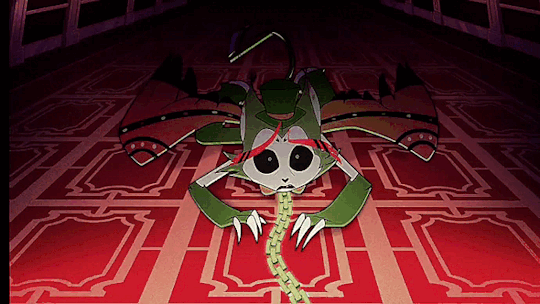
Husk is a powerful overlord, who lost his soul to a demon. Just like Alastor:
Husk: Big talk for someone, who's also on a leash.
Alastor and Husk are both on a leash. Still, Husk admits it and starts working on his shortcoming:
Husk: You're a loser, just like me
Alastor instead affirms his willingness to be in control and to pull the strings:
Once I figure out how to unclip my wings
Guess who will be pulling all the strings?
Alastor is a loser, just like Husk. Just like all the characters in hell. Sinners vs Winners. And yet, he refuses to admit it. This is why he makes no progress. Similarly, he wants freedom, but enslaves others. This isn't going to work out, which is why I am fairly certain he will eventually set Husk free. Probably by doing so, Alastor will make the first real step towards his own freedom. He will start integrating his own shadow.
Thank you for the ask!
#hazbin hotel#hazbin hotel meta#alastor#hazbin hotel alastor#charlie morningstar#my meta#asksfullofsugar#anonymous
408 notes
·
View notes
Note
Hi! Do you think Alastor and Lucifer are foils?
Hi!
Yes, of course they are!

Alastor and Lucifer's foiling starts in Dad Beats Dad (obviously), where they fight over Charlie's affection. They might seem as opposites throughout the episode, but they are actually the same, as they both try to impress Charlie with their powers:
[ALASTOR:]
They say, when you're looking for assistance
It's smart to pick the path of least resistance
[LUCIFER:]
Others say, that in your needy hour
There's no substitute for pure angelic power!
Still, Charlie doesn't care and all she wants is for her parental figures to support her:
Charlie: How come he can have faith in me, but my own father can't?
In short, Alastor and Lucifer find pride in their abilities, but need to let go of it, in order to show their love for Charlie. By the end of the episode, they both accomplish this. However, they succeed in slightly different ways, that fit their shared motif of shadow and light. In particular:
Alastor is linked to shadows, as his abilities let him manipulate shadows
Lucifer is linked to light, as his name means morningstar and his powers manifest in light-beams
As a result:
Alastor's development happens in the shadows, whereas Lucifer's in the light - This is true also on a meta-level, as Alastor's arc is the secondary plot-line of the episode, whereas Lucifer's is the main one
Alastor acts as Lucifer's jungian shadow and becomes a catalyst for him to change. Similarly, Alastor himself is challenged to grow by his own jungian shadow, aka Husk
What is the jungian shadow? It is the repressed part of a person. In stories, a character might meet another one, who embodies this hidden part of the self. By integrating with the shadow, the character evolves. In other words, Alastor represents a repressed part of Lucifer and Husk a repressed part of Alastor. Let's see how it all plays out.
ALASTOR, HUSK AND MIMZY
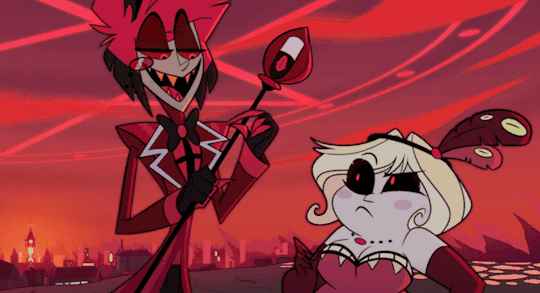
Alastor and Mimzy's bond is unhealthy, as they both enable negative sides of the other. On the one hand Alastor keeps covering for Mimzy, no matter what she does. On the other hand Mimzy feeds Alastor's ego by praising his power and abilities.
So, Mimzy never faces the consequences of her actions:
Mimzy: Thanks for helpin' lil' old me out of a though spot. You're always such a pal.
And Alastor feels respected and appreciated:
Alastor: It's nothing I can't handle. Don't worry Husker. Who in their right mind would cross me?
However, the reality is that Mimzy is using Alastor and Husk points this out:
Husk: You and I both know Mimzy only shows up, when she needs something. That bitch is trouble and who knows what kinda demon she fucked with to come running to you this time?
Not only that, but he openly calls Alastor out on his pride:
Husk: Big talk for someone, who's also on a leash.
Which results in Alastor reacting in anger:

That said, Husk is proven right. It turns out Mimzy has willingly brought chaos to the hotel, so that Alastor could solve things for her. Because of this, Alastor finally cuts ties with her:
Alastor: You deliberately brought danger to this place just to have me clean up your mess. I can't have that here.
This choice is important and it shows how the people around him are slowly impacting Alastor. On the one hand the Radio Demon listens to one of his subjects' advice. On the other hand he acts to protect the hotel. As a matter of fact the moment Alastor steps up as the Host of the Hotel isn't when he sings to Charlie in Hell's Greatest Dad nor when he transforms into a giant and fights. It is when he sends Mimzy away and sacrifices a little bit of his pride to do so. interestingly, this happens as nobody is looking at him, so he isn't really trying to impress nor to trick the others. He acts selflessly in the shadows.
LUCIFER, ALASTOR AND CHARLIE

Lucifer and Charlie's bond is strained:
Charlie: We just have never been close. After he and mom split, he never really wanted to see me. He calls... sometimes, but only if he's bored or like, needs me to do something.
At the root of this conflict there is Lucifer's inability to show his daughter how much he cares. He struggles to express his feelings and hides them behind a prideful persona:
Charlie: I told you when you called me five months ago. Or did you not listen?
Lucifer: No, no, no, no. Just, you know, I just forgot. I've just been really busy, ya know with um... important things.
Instead of openly admitting his depression and sadness he prefers to look cold and uninterested. Even dismissive and condescending, like when he arrives at the Hazbin Hotel:
Lucifer: Wow, this place sure looks, uh... Uh-uh. Yeah. Uh-uh. It's got a lot of character!
Lucifer is initially too focused on what he cares about - meeting his daughter - rather than on what Charlie wants - for him to help her with the hotel. He happily hugs Charlie and then immediately moves on to pet Keekee, Razzle and Dazzle, who are his own creations. Only later he considers the welcome Charlie and the others have prepared for him. Even then, he still misses the point and tries to buy Charlie's love by showing off his magical powers:

Haha, looks like you could use some help
From the big boss of Hell himself
Except that what Charlie wants from him aren't champaigne fountains or caviar mountains, but an appointment with Heaven, which he negates her. Not only that, but instead of being honest about his fears, he deflects everything on Charlie herself, by dismissing her plan:
Lucifer: Alright, listen, I love that you want to see the best in people, but these sinners... You know, they're just the worst. I, I don't know how much you can realistically expect from them in Heaven.
Luckily, the Radio Demon is closeby, as he forces Lucifer to show his true self.
On the one hand Alastor brings out Lucifer's insecurity and fears:
I'm truly honored that we've built such a bond
You're like the child that I wish that I had
I care for you, just like a daughter I spawned
It's a little funny, you could almost call me dad
He juxtaposes moments of everyday life and affirmations of affection to Lucifer's materialistic and fancy promises. In this way Alastor highlights the faults of Lucifer, as a father. He points out that Lucifer is never there for Charlie.
On the other hand Alastor embodies the kind of sinner Lucifer despises:
Lucifer: Ya see? What I tell ya? Charlie, sinners are violent psychopaths, hell bent on causing as much pain and destruction as they can. There's really no point in trying.
And yet, such a violent psychopath is more willing to help Charlie than Lucifer himself:
Charlie: Dad, stop! He's defending this hotel. It may be a bit more sadistic than I'd hoped. But he's doing it for me!
This realization leads to a confrontation between father and daughter and to an admission on Lucifer's part:
Lucifer: I just don't want you to be crushed by them like... like I was.
The problem isn't Charlie, but Lucifer himself. It is not that Charlie's dream is silly, but that Lucifer's one has been destroyed. This revelation is important because Lucifer's mask comes off and he shows Charlie his weakest and most broken self. He swallows his pride and has Charlie see who her father really his. In all his mistakes and his hurt. And to his surprise Charlie accepts him. Not only that, but she admires him:
So in the end, it's the view I had of you
That showed me dreams can be worth fighting for
Symbolically the song More than Anything starts with Lucifer and Charlie in the shadows:
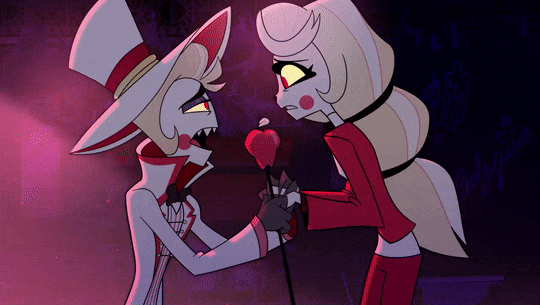
They are repressing a lot and have no idea who the other is. Still, as the song goes on, they get to understand each other:

All that I'm hopin', now that my eyes are open
Is that we can start again, not be pulled apart again
'Cause in the end, you are part of who I am
And they end the song surrounded by light:
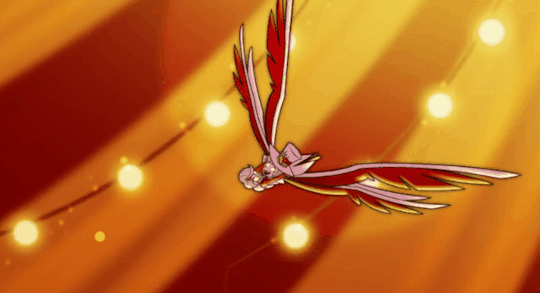
What is initially in the shadow comes to light in three different ways:
Lucifer shows Charlie his true self
Lucifer sees Charlie for who she is
Lucifer exhibits his weakness in front of the whole Hazbin Hotel. He lets the sinners he dislikes so much witness the mess that he is.
His fragility is in full display. It is in the light for everyone to see.
PHENOMENAL COSMIC POWERS! ITTY BITTY LIVING SPACE!

Another similarity Alastor and Lucifer share is that they are two powerful beings that give much importance to free will:
Alastor: You should know better than anyone what a soul can accomplish when they take charge of their own fate.
Charlie: Together, they wished to share the magic of free will with humanity.
And yet, they are both trapped:
Alastor: I'm hungry for freedom like never before
The constraints of my deal surely have a backdoor
Once I figure out how to unclip my wings
Guess who will be pulling all the strings?
Charlie: As punishment for their reckless act, Heaven cast Lucifer and his love into the dark pit he had created, never allowing him to see the good that came from humanity, only the cruel and the wicked.
On the one hand Alastor controls many souls, but his own is owned by someone else. On the other hand Lucifer is the strongest being in all of Hell, but he is regarded as a disgrace by other angels.
Moreover, they both project their unhappiness on others. Specifically, Lucifer blames sinners like Alastor:
Lucifer: Our "people", Charlie, are awful! They got gifted free will and look what they did with it! Everything's terrible!
While Alastor lashes out on his prisoners, like Husk:
Alastor: If you ever say that again, I will tear your soul apart and broadcast your screams for every other disrespectful wretch who dares to question me.
Still, the point is that Lucifer is exactly like Alastor. He is a gifted creature, who messed up royally and cursed humanity. Alastor instead is exactly like Husk, a powerful overlord, who still finds himself chained. Lucifer is the most hated being in all of creation and Alastor is on a leash. They are both lonely and desperate, but too proud to admit it. In other words, they are both losers:
Husk: There was a time I thought no one could relate
To the gruesome ways in which I'm damaged
But lettin' walls down, it can sometimes set you straight!
We're all livin' in the same shit-sandwich
Just like everyone in Hell. And yet, this is not bad per se. Even if you hit rock bottom, you can still climb back up, as long as you let go of self-importance and start to earnestly empathize with others. As a matter of fact it is only through community and bonds that a person can be redeemed and heal:
Out for love
Love
Think of who you care about
Protect them and be out
For love
Love
You're gonna fight without gloves
Long as you're out for love
This is what Alastor and Lucifer are learning through Charlie.
TWO DADS, ONE DAUGHTER

Season 1 sets up Alastor and Lucifer as two mentor figures to Charlie. They share this role in a way, which makes them almost perfect mirrors. Some examples:
Lucifer gives Charlie the hotel building and Alastor calls it Hazbin Hotel
Alastor helps repair the Hotel in the beginning, while Lucifer assists Charlie in building it anew by the end
Lucifer guides Charlie to Heaven, as he sets up her meeting with Sera and Emily. Alastor instead guides Charlie in Hell as he introduces her to Rosie and helps her inspire the cannibals
Both Alastor and Lucifer believe in Charlie, when she is at her lowest. Alastor does so before the final battle, whereas Lucifer after the fight
Alastor and Lucifer fight Adam (another foil of theirs) in the final episode. Moreover, both belittle his abilities and highlight how he is strong, but unskilled:
Alastor: You lack discipline, control and worst, you are sloppy!
Lucifer: So, this is what you've been up to since Eden? Gotta say, you really let yourself go buddy.
In particular, Alastor is the one supposed to take Adam down, but fails and Lucifer steps in by the end. This is just like in the beginning Lucifer is supposed to support and help Charlie with her project. Still, he is absent and Alastor fills the spot.
In other words, Alastor and Lucifer are unwillingly complementary and so far one has appeared when the other has been incapacitated. We'll see if this pattern continues. As for now, they are clearly framed as key to Charlie's development, so it is possible they will come to embody different sides of her:
Alastor represents the sinners Charlie wants to reach and all their pain and complexity. He is also linked to fear and the unknown. He is the ally she finds by herself. He is the found family Charlie chooses.
Lucifer represents the angels Charlie wants to communicate with. He is also linked to dreams and ideals. He is the legacy she inherits. He is the biological family Charlie wants to re-connect with.
In short, they are both parts of who Charlie is and she needs them to grow into herself. Just like they need her to mature and find redemption and happiness.
#hazbin hotel#hazbin hotel meta#alastor#alastor hazbin hotel#lucifer morningstar#lucifer hazbin hotel#my meta#asksfullofsugar#anonymous
204 notes
·
View notes
Note
do you think the song out for love says something about Camilla and veggie and to veggies character arc
Hi!
Yes, it does. I want to talk about Vaggie in other metas too, so in this analysis I will focus on her relationship with Carmilla, since this is what you are mainly asking about.
Before I start, though, I am gonna link to you this meta by @hamliet, where she talks about the main message of the song:
You're gonna fight without gloves
And when that push comes to shove
Yeah, you just might rise above
Long as you're out for love

If you love, you might rise above. So Vaggie, a fallen angel, regrows her wings by choosing love and protection over hate and revenge. The meaning is crystal clear. Love makes you worthy of Heaven. Just like in the finale Pentious ascends thanks to his selfless sacrifice.
This is the meaning of the song when it comes to theme and to the series as a whole.
At the same time it is not by chance this theme comes out so strongly in relation to Carmilla and Vaggie, as they are both tied to "love".
FAMILIAL LOVE AND ROMANTIC LOVE
Carmilla Carmine: So I, I'll be your keeper
Do whatever it takes, I'll make the mistakes
I'll keep you safe and keep this secret
Vaggie: So I, I'll be your armor
Do whatever it takes, I'll make the mistakes
I'll spend my life being your partner
Carmilla and Vaggie are set up as foils in episode 3, when they share the song Whatever It Takes. This ballad is a love song, but Carmilla and Vaggie express two different kinds of love:
Carmilla is singing to her daughters (familial)
Vaggie is singing to Charlie (romantic)
This is a pattern throughout the show:
There are two versions of More Than Anything - the first one is about a familial bond, whereas the second explores a romantic relationship
Sir Pentious gets redeemed after expressing his feelings for Cherri (romantic) and sacrificing himself for the Hotel Crew (familial)
So, Hazbin Hotel goes out of its way to celebrate all kinds of positive bonds: platonic, romantic, familial. All of these relationships are enriching and help people grow. Vaggie and Carmilla are two characters linked to this very concept, as they are ready to fight and suffer for their loved ones:
Both: Whatever we go through
I know I~ (Carmilla: I'll be your keeper)
(Vaggie: I'll be your armor)
Whatever it takes (Carmilla: I'll make the mistakes)
(Vaggie: I'll make the mistakes)
Whatever it takes
They are both warriors, but fight for love. They are out for love. However, Whatever It Takes also highlights a major difference between them.
TRUST AND SELF-EXPRESSION
Scrambled Eggs is an episode about trust. This is true especially for Carmilla and Vaggie, who have opposite secrets:
Carmilla killed an angel
Vaggie is an angel
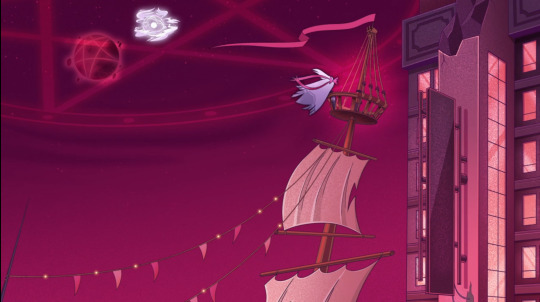
Throughout the song the conflict between Heaven and Hell is mentioned by Carmilla and is present in subtext in Vaggie's stanza, as she looks at her old home.
Both are struggling under the pressure of these truths and are confronted by a loved one:
Zestial: Carmilla, what troubles thou? Losing thy composure is unlike thee.
Carmilla Carmine: It's nothing, Zestial, really.
Charlie: Vaggie, don't say that! You do so much! It's-
Vaggie: I'm sorry. I'd… I'd like to be alone for a minute.
Carmilla chooses to open up to Zestial and tells her daughters how much she loves them. Vaggie instead closes herself off and refuses Charlie's attempt to talk. She is singing to Charlie, but Charlie herself isn't present to hear her out. Even when it comes to their respective secrets...
Carmilla says hers in the song:
Carmilla Carmine: I always thought that I would keep blood off my face
But when that thing attacked, I had to act
To cross that line and keep them safe
But if anyone knew, then all of Hell would rise to war
And who's to say who'd survive the fray?
I might lose the ones that I was killing for
Vaggie only alludes to hers in the lyrics:
Vaggie: When I saw your face
You made me feel like a stranger in a brand new place
And it felt so good to be understood
But there's so much I wished that I could say
Vaggie meets Charlie and feels like a stranger in a brand new place because at the time she is in fact a stranger in a brand new place:
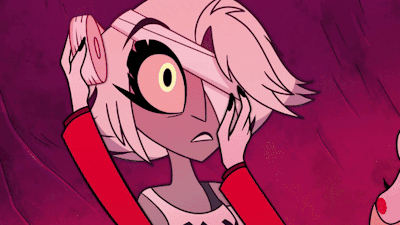
So, Carmilla is able to express herself, while Vaggie can't. This isn't surprising, as Vaggie is basically a child-soldier:
Adam: Do you really think I wouldn't recognize one of my top girls just cuz you're out of uniform? You were on the front lines, I wouldn't forget a bad bitch like you. It's why I named you after the best thing ever. Vaggie.
She is brought up in Adam's army and is taught that love is conditional. She is one of Adam's best fighters, but the moment she makes a "mistake", she is discarded:
Lute: Sinful filth like you has no place in heaven.
This is why she feels Charlie will love her only if she is useful and never messes up:
Vaggie: I'm supposed to make your dreams a reality. I'm supposed to protect you. I'm supposed to never fail you. (...) If I can't help you, what's the point of me?
This fear of abandonement and rejection is also at the root of Vaggie's inability to tell Charlie about her past:
Adam: I guess I'll just tell little miss butterflies and rainbows that she's been fucking someone who's killed-- thousands of her people. I'm sure your relationship will be fine.
Still, despite her communication issues, Vaggie's heart is in the right place:
Rosie: If there's anything I've learned, it's that words are cheap, but actions, they speak the truth. So, what have her actions said?
Vaggie is a person of few words. This may be why she has less songs than other characters. Still, she lets her actions speak, so she is given a ballet lesson by a very talented ballerina:

DANCING THROUGH LIFE
Carmilla has a ballet motif, as her outfit resembles that of a ballerina and her two daughters are called after protagonists of famous ballets. So, it is only natural that she teaches Vaggie a new way to fight through dancing.

Vaggie was taught to fight with hate and anger. So, her fighting style is aggressive and focused on attack:
Carmilla: You leave yourself open with every swing. You fight like someone unafraid of harm, and this is what you'll take advantage of. Angels wield no shields, little armor and fight with reckless abandon.
Carmilla tells her she should instead dedicate herself to love, protection and defense:
Fuel yourself with the fear of losin'
That somebody who's your reason to live
Harnеss your heart and you can't help choosin'
To fight with all you can give
Vaggie shouldn't just fight. She should dance:

She shouldn't hate:
I see you're driven by your detestation
Your every step is stoked with animus
You need a different type of motivation
Or there's no way that you can handle this
She should love:
Out for love~
Love~
Think of who you care about
Protect them and be out
For love~
Love~
Vaggie listens to these teachings and applies them in the finale, in two ways.
She sings her love for Charlie in More Than Anything Reprise:

Vaggie: You've already done so much
So many lives you've changed
So many souls you've touched
And in the end, if it's only me you've saved
Charlie and Vaggie: There's something that I've been dying to say
More than anything, more than anything
Need you to know I love you more than anything
More than anything
As stated above, Vaggie doesn't sing much in season 1, but in the final episode she gets a short moment to express how she feels to Charlie. This is in contrast to Whatever It Takes, where she sends her girlfriend away before she starts singing. More Than Anything Reprise shows Vaggie's progress when it comes to self-expression.
She follows Carmilla's advices while fighting
On a practical level she covers herself up in a battle suit inspired by Carmilla's outfit, she wears a harness on her heart and ties her hair:
Vaggie: I'm not used to fighting with long hair.
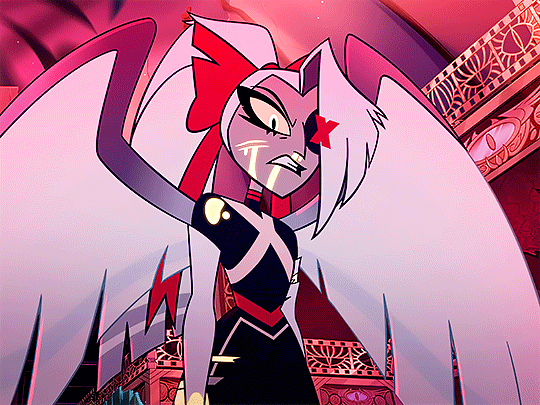
On a thematic level she reveals her wings and defeats Lute, when the exorcist threathens Charlie:
Lute: So, I'll spare you the pain of seeing your demon bitch die.
And Vaggie eventually chooses not to kill the other angel:
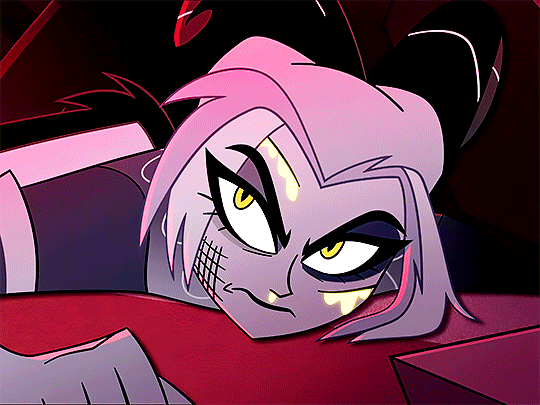
Lute: Do it, then. Correct your mistake.
Vaggie: Seriously, you're pathetic, you know that? Ready to die rather than accepting mercy? No, live. Live knowing that you only do because I let you, the failure.
Vaggie is asked to choose between her hate for Lute and her love for Charlie and she chooses the latter. This is why the scene ends with Vaggie leaving Lute and flying to help Charlie. She is given the chance to get revenge, but doesn't take it. She is given the chance to hate, but she loves:
I know you're thirstin' for vengeance, Vaggie
You're out for blood
But you'll only stand a chance if you're out for love
This is important in two ways:
1- The macrochosm - Vaggie refuses Lute's ideals and defies her expectations. For Lute it is normal that Vaggie is going to kill her. After all, Vaggie is discarded because she shows pity to a sinner, which makes her weak. Still, Vaggie bests Lute in a fight, so she is now strong. It is only obvious then that Vaggie has snapped out of her foolery and is ready to kill. She can correct her mistake. She did not kill the cannibal child, but she can kill Lute. This is how Lute understands the world. And yet, Vaggie doesn't finish her off. By doing so, she moves away from the mentality Lute embodies. She is strong precisely because she can show mercy. Adam is wrong. Lute is wrong. Vaggie isn't out for blood. She is out for love.
2- The microchosm - Vaggie sparing Lute isn't just the morally correct choice, but it is Vaggie's first step into healing:
Husk: (To Vaggie) This one. Judges everyone and everything because she hates herself.
Vaggie hates everyone because she deep down hates herself. She despises Heaven and Angels because she can't forgive her involvement in the exterminations. So, Vaggie hurting Lute would be Vaggie hurting her past self. As a matter of fact Lute is Vaggie's dark mirror. She is who Vaggie might become if she gives in to hate.
A person who hurts others:

And herself:

Vaggie instead has to value her life, so that she can protect others. She must save others and heal herself. Only in this way she can be by Charlie's side. She needs to let go of self-hate to embrace a healthy love. Vaggie's arc is her learning self-love through her bond with the Princess of Hell.
Obviously this journey is just at the beginning and our Angel of Love has a long way to go. How will her story contiue? We can make some hypothesis, which once again stem from Vaggie and Carmilla's foiling. This is just a theory, so take it with a grain of salt, but Vaggie may have a secondary personal antagonist in Hell:

Why is that so? It's because Scrambled Eggs sets Vaggie and Velvette up as foils.
RESPECT(LESS)
Velvette and Vaggie are opposites in their interactions with Carmilla. Both girls are younger than the Dancer Overlord and could learn a lot from her. However, Velvette refuses any kind of mentorship and shows no respect:
Velvette: Mad that I acted respectless? Well, it's cause no one could respect this!
You're long past trending! Sorry, bae, but I ain't swiping right! You've lost your relevance-
Vaggie instead comes to respect Carmilla and learns from her:
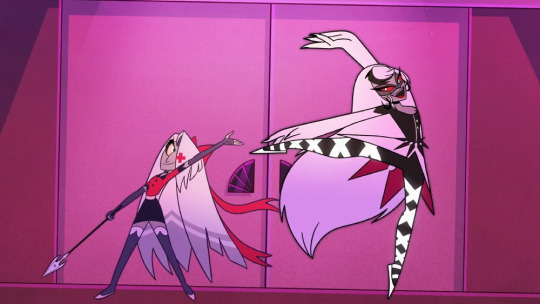
At the same time, both Velvette and Vaggie confront Carmilla about her secret:
Velvette: 'Oops!' Did I strike a nerve?
'Cause when I brought out the angel's head, couldn't help but observe, that your wrinkled face was turning red!
And why are you avoiding war? That's what the guns you sell are for!
Thanks to my being respectless, one thing I'm starting to suspect is
You know why this angel's headless! Do you have a disclosure?
Vaggie: I know what you did on extermination day. We can talk about it inside, or I can yell about it out here.
They call Carmilla out on killing an angel and keeping this knowledge to herself. Not only that, but both argue that it is necessary to fight back to stop the exterminations:
Velvette: We found it during Extermination day. If these Holy Rollers can be killed, the game has changed. We can take the fight to them. The boys and I have come up with a full assault plan!
Vaggie: Miss Carmine, I'm here on appointment from the princess to enlist your aid in the defense of hell from the angelic extermination. We know an angel fell at your hands and we need to know how.
Still, Velvette fails to get through to Carmilla because she uses war rhetoric:
Velvette: Oh, I get it. So Grandpa is too pussy to fight, so I guess there's no point, right? Oh, what's the matter, Fossil? Too senile to make a real power grab...
She speaks of violence, strength and power.
Vaggie instead convinces Carmilla to help because she mentions the necessity to fight for loved ones:
Vaggie: We didn't pick this fight, but it's here now. And they aren't going to stop with us. You didn't see the look on their leader's face. With us out of the way, it's only a matter of time before they come for the rest of you. They won't stop until all of hell is wiped out, so you can help us make a stand here together, or you can stand alone tomorrow.
She speaks of protection, love and comraderie.
In short, Vaggie succeeds where Velvette fails. Of course, this is true for Charlie's group in general when it comes to the Vees:
Vox: My dear people! We at VoxTek Enterprises have always been at the forefront of innovation. And now, with this new oncoming threat, we are shifting our focus, to your protection. We are pleased to announce VoxTek Angelic Security is coming soon! Trust us, with YOUR safety.
Katie Killjoy: Breaking news - Extermination day is cancelled! Charlie Morningstar managed to fend off the angelic attack with more than just nice words.
The Vees make big declarations of how they are gonna protect the people of Hell, but in the end it is Charlie and her friends who fight for the sinners.
When it comes to Vaggie and Velvette specifically, it is going to be interesting if their foiling is expanded. If so, then I guess Velvette is gonna help Vaggie mature a little bit more, so that when our ex exorcist faces Lute (her nemesis) again, she is gonna be ready for it.
#hazbin hotel#vaggie hazbin hotel#vaggie#carmilla carmine#velvette hazbin hotel#chaggie#charlie x vaggie#hazbin hotel meta#my meta#asksfullofsugar#anonymous#hazbin lute
117 notes
·
View notes
Note
Have yo read Captive Prince? What do you think of Laurent's character? Does he foil any other characters (besides being mind to Damen's heart)?
Hi!
Yes, I have and I love Laurent <3 He has the most complex arc and is at the centre of the major conflict, so he foils several characters, who are used to explore his personality and to progress his arc.
In general, I would say three major jungian archetypes are used in Laurent's story:
Inner Child = the childish and most vulnerable part of a person, which is influenced by one's younger years. Laurent's inner child is embodied primarily by Nicaise, but also by every boy abused and raped by the Regent.
Shadow = the repressed part, which the person doesn't want to aknowledge. Laurent has severals: the Regent himself, Aimeric and Jokaste. They all embody Laurent's most negative side.
Anima/Animus = the anima is the female side of a man and the animus is the male side of a woman. It is usually used in romantic subplots to show two characters growing closer. Here, it is embodied by the bond between Laurent and Damen.
Laurent's arc is one where he integrates with Damen, but to succeed he also needs to save his inner child and to face his shadow. Or to fail and try again.
BROTHERS AND LOVERS
Laurent and Damen foil each others' brothers:
Laurent foils Kastor: both are the unfavourite child, but Laurent adores Auguste, while Kastor resents Damen. At the same time, Damen perceives them in opposite ways. Damen initially doesn't aknowledge the good in Laurent, while he doesn't see the evil in Kastor. It is as Nikandros says. At the beginning of the story, Damen sees things in black and white. By getting to know Laurent he learns complexity and that the world is in shades of grey. He integrates his own heart with Laurent's mind. His own idealism with Laurent's wisdom.
Damen foils Auguste: both are strong fighters and beloved leaders, able to inspire others. The moment Auguste dies, Laurent loses his heart and it is only with Damen that he learns to trust and to open up again. It is also through Damen that he overcomes Auguste's death and his sense of inferiority, which is carefully nurtured by the Regent. Laurent is brilliant, but his arc is about showing vulnerability and find new faith in others. He integrates his mind with Damen's heart. His wisdom with Damen's idealism.
So, as you said, Laurent is the mind to Damen's heart and has to rediscover his own interiority. He needs to love himself again. Only by doing so he can truly escape the Regent and grow up. This process of growth is the main focus of the trilogy and it happens twice:
Laurent fails to grow in the second book
Laurent succeeds and completes his growth in the third book
Let's see how.
NICAISE AND AIMERIC = LAURENT'S DARKEST HOUR
Laurent's darkest hour happens at the end of the second book. This is common for a trilogy. It is not rare for the second installement to end in a negative way. Now, The Prince's Gambit doesn't end badly. Laurent and Damen win and grow closer. Laurent even frees Damen and they have sex for the first time. Still, psychologically, Laurent risks a huge brakdown because of Nicaise and Aimeric's deaths.
Nicaise and Aimeric are two parts of Laurent:
-Nicaise is Laurent's child-self. He is petty and capricious, but he cares deeply. And yet, he can't show any vulnerability. The moment he does, he is killed. Moreover, Nicaise plaids for Laurent because he deep down thinks the Regent won't kill him. This is true for Laurent, as well:
"I didn't think he's really try to kill me" Laurent said "After everything... even after everything".
-Aimeric is Laurent's shadow. He is a young man, whose life is defined by the Regent's sexual abuse. Aimeric confuses the Regent's imitation of love with true care and fights to get it back, even if it means hurting people, who truly love him. Unconsciously, this is true for Laurent too:
"You play his games like you want to show him you can. Like you're trying to impress him. Is that it? You need to beat him at his own game? You want him to see you do it? At the expense of your positions and the lives of your men? Are you that desperate for his attention? Well, you have it. Congratulations. You must have loved it that he was obsessed enough with you that he killed his own boy to get at you. You win."
Damen's speech to Laurent is basically the same one Laurent gives Aimeric. Aimeric shines light on this specific aspect of Laurent. Laurent too still loves his uncle. He too wants his attention and on some level thinks of his uncle as his only family:
"When you lost your brother, was there someone to confort you?"
"Yes," said Laurent. "In a way".
So, Nicaise and Aimeric embody Laurent's vulnerability. Nicaise is the child who still feels safe with the Regent. Aimeric is the young adult, who wants the Regent back. Both are Laurent. This is why Laurent wants to rescue them both. He grows close to Nicaise and tells him he will buy his contract and free him. He accepts Aimeric into his guard and refuses Damen's advice to send him away. And yet, the Regent uses them both against Laurent. He kills Nicaise and has Aimeric betray Laurent.
Laurent wants to help both Nicaise and Aimeric and the Regent tells him he can't. Just like he can't save himself.
According to the Regent's narrative:
Laurent is fond of Nicaise, but eventually leaves him alone out of selfishness
Laurent welcomes Aimeric in, but this is a blind spot that is used against him
By using vulnerable and abused kids, the Regent conveys to Laurent two messages. On the one hand Laurent isn't selfless enough to truly save anyone. He isn't good enough to be a protector like Auguste. On the other hand he is still foolish enough to trust others. He isn't smart enough to be a mastermind like the Regent. Too cruel and too foolish is how the Regent wants Laurent to see himself. So, that Laurent would feel trapped and cut others out.
And Laurent almost gives in, but is stopped by Damen:
"You tried to hurt me, and you have. I wish you would see that what you have just done to me is what your uncle is doing to you."
Damen goes through to Laurent and stops him from losing himself. He saves him from turning into a copy of the Regent.
THE REGENT
The Regent is Laurent's negative foil. He is who Laurent could become if he gave in to his worst instincts. As a matter of fact Laurent shares many similarities with his uncle:
Both are very intelligent master manipulators
Both are able to seize people's weaknesses and to use them
Both can be cruel and ruthless
Both tend to complicate things
This isn't by chance because the Regent does his best to break Laurent's heart and to warp his mind into a frailer copy of his own. He needs Laurent to think like him and to follow his rules, so that he can beat his nephew. This is why the Regent spends the years after Marlas by abusing Laurent in different ways.
The Regent's abuse has a double nature:
It has a sexual component: the Regent rapes Laurent multiple times as a child and shows possessiveness of him as a young adult. For example, many of his assassin attempts come with a sexual element. The assassins instructed to rape Laurent by using a drogue the Regent clearly used on his nephew as a child. Having Laurent and Damen sleep together, so that Laurent would eventually kill himself. Twisting Laurent and Damen's love story, as if to frame Laurent as dirty and despicable. Spreading voices about Laurent's supposed romantic feelings for Auguste. And so on...
It has an emotional component: the Regent keeps mentioning Auguste, which hurts Laurent in two ways. On the one hand it doesn't let him move on from his brother's death. On the other hand it drills into Laurent he isn't as good as the previous prince
"I hate to see you grown up like this," said the Regent, "when you were such a lovely boy."
The Regent basically blames Laurent for both growing up (physically) and not growing up (psychologically). He manipulates him by treating him as a child, while implying he isn't pure as a child anymore. The result is that Laurent hates himself.
This self-hate manifests itself in recklessness, suicidal tendencies and self-destroying behaviors. Like Laurent lashing out at others, when he is actually furious at himself. This is why specifically Laurent breaks Aimeric by using their shared trauma as a weapon. He hurts both Aimeric and Jord (who hasn't done anything, but being loyal to Laurent) because to truly face Aimeric means to accept himself and he can't.
Symbolically, Laurent kills Aimeric like he is slowly killing himself. This is why Aimeric's death happens after the reveal of Nicaise's murder by the Regent. Laurent kills Aimeric, just like the Regent kills Nicaise. Both victims are abused kids with frail and unstable senses of self, who deep down seek love and vulnerability. The lesson Laurent needs to learn is that he can't save the Nicaise within himself, if he doesn't help the Aimeric too. This is why it is important that Laurent is able to express empathy for Aimeric and to recognize he is a wounded person, just like Nicaise:
"Nicaise knew that when he got too old, he would be replaced."
"Like Aimeric," said Damen.
Into the long silence that stretched out between them, Laurent said: "Like Aimeric."
It is the first step to aknowledge his own hurt too.
AUGUSTE WASN'T GOOD ENOUGH
The second step is instead to face Auguste's ghost. Laurent's big brother is a double edged sword for the Prince. On the one hand Laurent deeply loves Auguste and is devastated by his dead. On the other hand his idealization of Auguste is unhealthy and leads to Laurent undervaluing himself.
These powerful contradictive feelings come to the surface in his "sparring" match with Damen. There, Laurent for once is able to show all his anger and grief. He lets it all out and is forced to accept he would have never been able to kill Damen in a fight. Still, another realization comes to the surface:
"I know," said Laurent, "that I was never good enough."
Damen said, "Neither was your brother."
"You're wrong. He was -"
"What?"
"Better than I am. He would have -"
Laurent cut himself off. He pressed his eyes closed, with a breath of something like laughter.
"Stopped you." He said it as though he could hear the ludicrousness of it.
Damen's words might seem cruel, but they are actually necessary because they break Laurent's internalised idolisation of Auguste. Laurent has been brought up with the convinction that Auguste is somehow better than him. This idea is present even before Auguste's death because of their father's favouritism. The early loss of his brother and subsequent abuse only makes this feeling stronger. Hence why Damen refusing this helps Laurent grow. Damen is the first one to see Laurent as his own person and to give him a choice:
Damen picked up the discarded knife, and when Laurent's eyes opened, he put it in Laurent's hand. Braced it. Drew it to his own abdomen, so that they stood in a familiar posture. Laurent's back was to the post.
"Stop me," said Damen.
Laurent chooses to give up on his revenge. He chooses his present relationship with Damen over Auguste's ghost. He starts wishing for something positive for himself. He starts caring for himself. He starts looking toward a possible future.
JOKASTE = OPENING THE DOOR
To reach this future Laurent has to face Jokaste, who is really another version of Laurent:
"You're lucky we're alike," Jokaste said, stepping down. She and Laurent looked at one another like two reptiles.
Not only that, though, she is Aimeric and Nicaise combined in a single character:
Like Aimeric, she betrays a lover for selfish reasons (apparently)
Like Nicaise, she is caught up in a power struggle and has to choose the side, which ensures her survival, even if it means negate her heart to do so
"You mean, the only difference between us is that I chose the wrong brother?"
As the stars began to drift across the sky, Laurent thought of Nicaise, standing in the courtyard with a handful of sapphires.
"I don't think you chose," said Laurent.
This time Laurent is able to see this. He empathizes with Jokaste and gives her freedom. He opens her the door:
"We're alike. You said that. Would you have opened the door for me? I don't know. But you opened one for him."
In this way Laurent understands the Aimeric he could not understand and saves the Nicaise he could not save. By the end, Aimeric (Jokaste) is shown mercy and Nicaise (her baby) survives. Laurent gives Jokaste and her family a future. And in this way, he symbolically gives himself a future and a family. He opens his own door.
THE TRIAL
The climax of the trilogy is Laurent's trial in Ios. This choice is interesting on multiple levels:
It is an inversion of the ending of book 1, where Damen is blamed for the assassination attempt on Laurent's life and Laurent protects him. In fatc, it is not by chance that Damen mentions the episode in his initial defense of Laurent.
It shows Damen and Laurent's integration. As a matter of fact Damen is the one who realizes Paschal has the key to dethrone the Regent. He is able to do so because through Laurent he has learnt to observe others, to understand them and to empathize with them. Laurent instead selflessly gives everything up for the person he loves and bravely faces off the Regent with no plan, but simply with his heart. The Regent tries to turn it into a weakness and to force Laurent to give it up, but fails. Finally, he and not Damen is the one who fights Kastor and kills him. He uses the skills he has learnt for his revenge and uses them to protect Damen, instead. He chooses life and love over death and hate.
Most importanlty, though, the trial starts as a farce, but by the end it becomes a fair administration of justice, which punishes the criminal and recognizes the innocent. Let's see how this change happens.
NICAISE = VICTORY
Laurent wins not because of his mind, but because of his heart. Specifically, he wins because of the relationships he builds and of his ability to empathize with the humblest people, those nobody cares about.
First of all, Laurent obviously wins thanks to Damen. It is Damen choosing him over his kingdom that makes it possible to the tides to turn. So, it is because Laurent overcome his internalized hate for Damianos and slowly comes to accept and love him, that he is saved in the end. In a sense, the night where he has to choose if to let Damen die or to save him out of loyalty in volume 1 is when Laurent chooses who he wants to be. He can let a man he hates die without risking anything, like the Regent would. Or he can save that man our of a sense of fairness, like Auguste would. Laurent chooses the latter and makes the first true move towards his victory.
Secondly, Laurent is able to touch the councilors' sense of morality thanks to Loyse, Aimeric's mother. She reveals that her husband basically sold Aimeric to the Regent in exchange of power. She also explains how the Regent conspired with Kastor to kill Theodemes. This testimony isn't decisive because the assassination of Theodemes is a matter of Akielos. Nonetheless, Loyse re-opens the trial and gives importance to Aimeric's story and pain. It is also important that she is a woman because the Regent hates women. She is the character nobody considers, as everyone is focused on Guion's, the powerful councilor. And yet, Laurent does and convinces her to break free from her husband influence for the sake of her son.
Thirdly, Laurent is saved by Paschal's testimony. That said, Paschal is only able to reveal the truth about the Regent's murder of the King only because of Nicaise. In general, Nicaise is a character, who ends up being important in the finales of all three books:
In book one, Nicaise goes to Laurent's apartments after the attempted murder. He is clearly worried and can't decide if to openly switch sides and tell Laurent the truth or not. He also appears to tell Laurent goodbye and to give him his earrings. Symbolically, Laurent is saying goodbye to his younger and most innocent self, as he prepares to enter war with his uncle.
In book two, Nicaise's death is revealed in the climax and it leads to Laurent's decision to march on Charcy. It also kickstarts Laurent's deepest psychological crisis, as he struggles to keep a clean mind and shows how deep he is hurt and desperate.
In book three, Nicaise is the one who indirectly hands Laurent victory, as it is him who stole Govart's papers and gave him to Paschal.
In other words, Nicaise is the one who leads to victory, which fits his name. As a matter of fact Nicaise means "victorious", the person who brings victory and he delivers.
Thematically, this is very important, as Laurent initially regrets to have grown close to Nicaise:
"I killed Nicaise when I left it half done. I should have either stayed away from him, or broken his faith in my uncle. I didn't plan it out, I left it to chance. I wasn't thinking. I wasn't thinking about him like that. I just... I liked him."
He believes that because of their sibling-like bond Nicaise is now dead. He believes his influence isn't enough to break the Regent's control over Nicaise. And yet, it is precisely because of Laurent's love and care for Nicaise that the boy is able to rebel himself enough to steal key documents and to hand them to Laurent's side. Nicaise dies tragically, but his life and Laurent's kindness to him are not in vain. They change the destiny of two kingdoms. Laurent isn't able to save his child-self, but his child-self is strong enough to save him. Just like Laurent might not cancel what happened to him in the past, but can still move forward:
"Stop it, you're hurting him. You're hurting him. Let him go." A soldier was holding him back, and the boy was fighting him.
Laurent looked at the boy, and in his eyes was the knowledge that some things couldn't be fixed. He said, "Get that boy out of here."
The new Regent pet once again mirrors a part of Laurent. The side of him that still sees the Regent at family. And yet, Laurent is finally able to accept this part of himself, but is strong enough to start healing. Just like as King he has now the chance to help as many children as the Regent hurt. Laurent ends is arc by growing up. He isn't a child anymore:
"You think you can defy me?" the Regent said to Laurent. "You think you can rule Vere? You?"
Laurent said, "I'm not a boy anymore."
He isn't a boy anymore, he can't be controlled by the Regent anymore. He can now start a new life as his own person, free from the Regent and from Auguste's ghost. A life of love and new relationships.
#the captive prince#captive prince#laurent#damen#damianos#the regent#aimeric#nicaise#jokaste#my meta#the captive prince meta#asksfullofsugar#anonymous
149 notes
·
View notes
Note
Hi! Can you analyse "More Than Anything" from HH?
Hi!
Sure! More Than Anything is actually my favourite song of season 1! It is so sweet and very loaded thematically and character-wise!

I have briefly talked about it in this meta, but here it comes a deeper analysis!
LUCIFER AND CHARLIE: DREAMING OF LOVE
More Than Anything has two main themes that come together in Lucifer and Charlie's relationship:
Love
Dreams
The father-daughter bond is rooted in both. Specifically, they express love through dreams. Or if you prefer, they dream of love.
This is explored in the first two stanzas.
Firstly, Lucifer explains that his dreams were broken:
You didn't know that when I tried this all before
My dreams were too hard to defend
And in the end, I won't lose it all again
And that Charlie is now the only dream left, which is why he will protect her:
Now you're the only thing worth fighting for
More than anything, more than anything
I'll shelter and adore you more than anything
Charlie replies that it was Lucifer who inspired her dreams:
So in the end, it's the view I had of you
That showed me dreams can be worth fighting for
And adds that her dream is for her people to be safe:
More than anything, more than anything
I need to save my people more than anything
So, father and daughter are the opposite and the same.
On the one hand Lucifer believes fighting for dreams isn't worth it (my dreams were too hard to defend). On the other hand Charlie insists that it is (dreams can be worth fighting for). At the same time, Lucifer dreams of protecting (loving) Charlie, whereas Charlie dreams of protecting (loving) all her people. Desperation and microchosm vs hope and macrochosm. This is the root of Lucifer and Charlie's foiling at the beginning of the song. How does this juxtaposition develop? Let's go deeper by exploring some imagery present in the song.
LIGHT AND SHADOW
More Than Anything uses a light/shadow motif to express the two main themes:
Love (1): lights and shadows comment Lucifer and Charlie's bond. They both have been hiding parts of themselves (shadow), but throughout the song they show their true selves (light)
Dreams (2): light is a metaphor of dreams and of how the characters relate to them
1- More than Anything starts with Lucifer and Charlie distant and in the shadows.
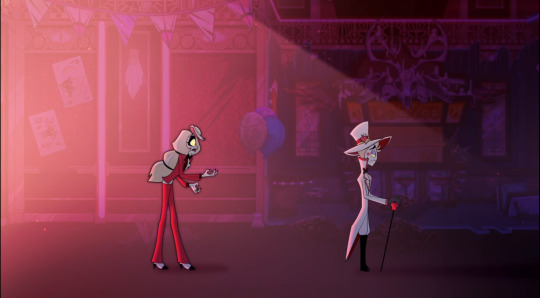
They are repressing a lot and have no idea who the other is. Still, as the song goes on, they get to understand each other:
All that I'm hopin',now that my eyes are open
Is that we can start again, not be pulled apart again
'Cause in the end, you are part of who I am
And in the end they embrace in the light.
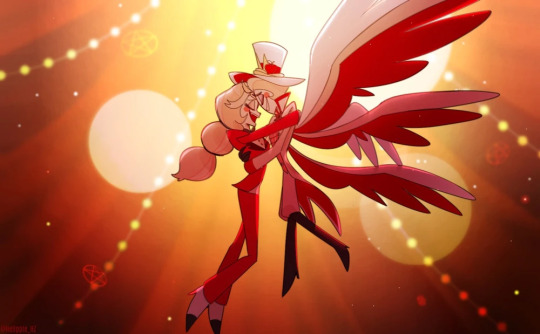
What is initially in the shadow comes to light. So, Lucifer and Charlie see each other for who they are.
2- Lucifer mentions his past dreams and summons light. However, he throws it away because he has given up on his ideals:

Charlie hurries to pick the light up, just like she is pursuing Lucifer's discarded beliefs with her Hazbin Hotel project. Still, Lucifer stops her and holds her hands. His daughter is his new dream and he is ready to throw everything away, if he can protect her.
This resolution is highlighted in the next sequence:
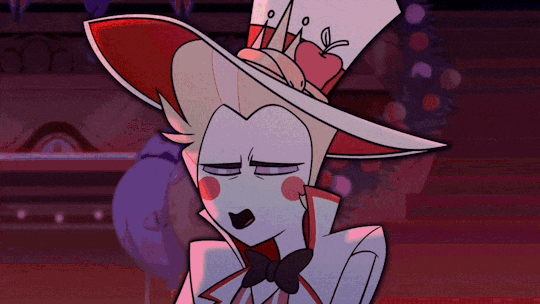
Lucifer remembers the Elders of Heaven attacking him, then he imagines their weapons pointed at Charlie. Out of fear he drags her away. What's interesting is that Charlie is targeted when she stands in the light, while the moment Lucifer pulls her to safety, she steps into the shadows. The meaning is clear. Lucifer fears that if Charlie takes the spotlight, she will attract Heaven's anger. So, he wants her hidden and sheltered in the shadows. Just like a child. This is why his hug is sweet, but also suffocating:

Charlie wants a different kind of love. She needs the father who inspired her with dreams and stories. Specifically, Charlie remembers a light show Lucifer put up for her on the spot:

This scene is key and it combines the light/shadow symbolism with another motif.
THE UGLY DUCKLING
In their flashback, Lucifer tells Charlie a fairy tale by using light as a medium. The story itself is pretty obvious:
I never dreamed of so much happiness when I was the Ugly Duckling!
A little duck swims in a pool of water, but suddenly grows into a beautiful swan. Lucifer's Ugly Duckling is a metaphor of his situation, as the swan has six seraphim wings and shines at the centre of the universe. Specifically, Lucifer's fairy tale is the inversion of his own story.
Lucifer used to be a beautiful seraphim, but fell from Heaven and lost his family (the angels). He is now stuck in Hell, as a little duck:
Lucifer: Now presenting… the magic-tastical back flipping rubber duck! Haha! That spits fire!

Oh look! Lucifer himself is a magic-tastical duck, who spits fire :P
So, his fairy tale gives a happy ending to his own tragedy. It is a wish. A dream. It indirectly shows how Lucifer has been handling pain and misery by creating. It also suggests that Lucifer puts himself at the centre of his dreams. He is the ugly duckling.
At the same time, Charlie's narration tells us about herself and how she sees her father.
When I was young, I didn't really know you at all
I always felt so small
But I hеard your stories and I was enthralled
Thе tales about your lofty dreams, I listened breathlessly
Imagining it could be me
First of all, Charlie states she never knew who her father was. It is implied Lucifer kept his distance because of depression:
Charlie: We just have never been close. After he and mom split, he never really wanted to see me. He calls, sometimes, but only if he's bored or like needs me to do something.
This is highlighted in Charlie's memory too, as Lucifer appears in a dark study room. Not only that, but he is in the spotlight, while Charlie is in the shadow, which is a metaphor of how she felt distant from him:

Still, Lucifer embraces little Charlie and shows her some light. He reveals a caring and idealistic self that Charlie is initially unaware of. And this version of Lucifer inspires his daughter.
This affirms that Lucifer's dreams aren't useless. Sure, they are left unfulfilled, but they still motivate Charlie. They are why Charlie is who she is. Moreover, Charlie is enchanted by a simple story, not a big manifestation of power. It isn't a theme park or a circus or human free will. It is a short fairy tale Lucifer comes up with in a matter of seconds. No matter how small, a dream always touches dreamers.
Secondly, Charlie sees herself as the protagonist of the story. She wants to be at the centre of her father's universe and to make him proud. Well, Charlie is going to do exactly this. She is Lucifer's dream. She will fulfill his ambitions. She is turning into a beautiful swan.
Lucifer's arc starts when he understands this:
I've been dyin' to find out who you are
I've been waiting, wanting the same thing
Looks like the apple doesn't fall far
Took you a while
I've missed that smile
The King of Hell has been stuck in his own head, consumed by his depression. This is why he is initially alone and surrounded by mediocre rubber ducks. He can't create anything new because he is too focused on himself. The moment he opens his eyes and looks at Charlie, he finds hope again:
I'll support your dream, whatever lies in store
And who could ask for more?
Charlie is his new dream, so he should do his best to help her become who she has the potential to be.
When Charlie is a child, Lucifer tells her a story, where he himself is the protagonist. Now that Charlie is an adult, Lucifer must accept Charlie is the protagonist of her own story. And he must help turning this story into reality. This will be his greatest creation. A duckling becoming a swan. A daughter growing-up.
PASSING THE TORCH

This frame has Lucifer:
Use his light again
Spread his wings
He starts the song by throwing his light away, but ends it by summoning a bigger and brighter torch. Similarly, he starts the episode making rubber ducks out of depression, but ends it with beautiful swan wings.
This metamorphosis happens because Lucifer isn't putting himself at the centre of the universe anymore. Rather, Charlie is his universe.
Lucifer creates a pocket-dimension, which is a bigger version of the fairy-tale of the flashback and has Charlie be its protagonist. He has her play with water, like the little duckling:

And has her fly at the centre of the scene like the swan:
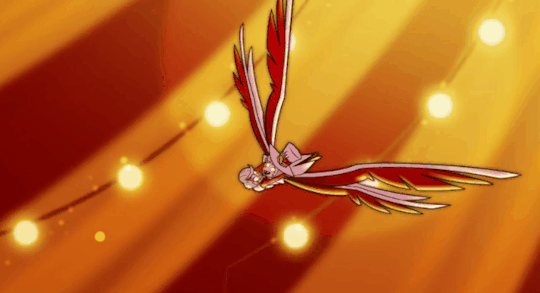
In this scene, he gives her the spotlight, both in how he exits the frame and in how he has the light follow her. Charlie is the swan shining brightly at the centre of Lucifer's world (the circus).
More Than Anything starts with Lucifer desperate and focused on the microchosm. It ends with him finding hope in Charlie, who becomes the key to a bigger and more beautiful reality.
Lucifer's biggest success is that he gave birth to Charlie and showed her the light (dreams), even when he himself felt engulfed by the darkness (hell).
#hazbin hotel#hazbin hotel meta#lucifer morningstar#charlie morningstar#my meta#asksfullofsugar#anonymous
93 notes
·
View notes
Note
Do you think Adam will come back as a demon, having to redeem himself? It kind of feels like that's where the few hints at smth deeper going on with him are going.
Hi!
I mean, there is this:
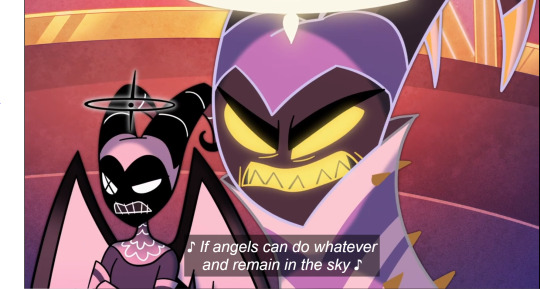
As Charlie and Emily sing about amoral angels staying in the sky, the focus is on Adam and he looks very triggered. I also personally hope he comes back because I think his character offers great opportunities to explore others. Like Lucifer, Lute, Sera, Lilith and Charlie herself. That said, I am also okay if he is meant as a one-season villain tbh. In this case, I trust it is because the story has other plot-lines to follow. Also, it would be an hilarious call-back to his line:
A man only lives once, we'll see you in one month
Gotta say, I can't wait to
Come down and exterminate you
Adam, you're either right in how THE man only lives once, or you are so wrong and Charlie is so right, that you yourself get a second chance :P
That said, I think there is clearly more about Adam, Eve, Lilith and Lucifer's dynamic that needs to be addressed (either through Adam coming back or in other ways):
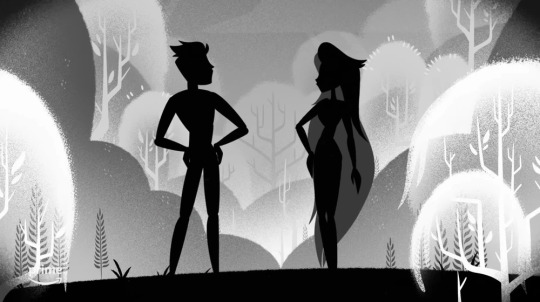
The series starts with the retelling of the myth of Eden in the form of a fairy tale. Still, it is clear that we are given only partial information.
Lucifer: Well, your first wife didn't seem to hate what I had to offer…or the second! Bowchicka pow pow!
Sera: He was the first human soul in heaven…
It is very unclear what happened with Eve and Adam himself is judged a "virtuous soul", after his human death. Not only that, but he affirms what brought him into Heaven is:
Vaggie: reading list "Act selfless, don't steal, stick it to the man." Are you fucking serious?
Except that Adam never once acts selflessly throughout the whole season. So, I wonder if an eternity spent being spoilt in Heaven made him worse.
In short, the things I am interested in when it comes to Adam are:
If and how Heaven has changed him
His relationship with Lucifer and Lilith (Eden + his pact with Lilith)
Let's now try to analyze Adam, starting with what we have in the series.
ADAM THE ANGEL

Adam: Call me, Dickmaster.
Adam is introduced as a powerful angel and a jerkass mysoginist. Both things are important, as they tie to different conflicts:
Adam is a genocidal maniac, who mistreats everyone. Still, he is considered a virtuous soul and holds some authority in Heaven.
Adam is "the man" and is shown discriminating and dismissive towards women. According to Charlie's recount in Overture, his mysoginy might be at the very root of the conflict behind the forbidden fruit and the birth of Hell.
These two sides of Adam come together in his interactions with Charlie, who is both a demon and a woman.
1- He dismisses Charlie's ideas of redemption in his song Hell is Forever, which is full of Christian references:
'Cause it's cut and dry
Fair is fair, an eye for an eye
And, when all's said and done (said and done)
There's the question of fun
And for those of us with divine ordainment
Extermination is entertainment!
Guitar solo, fuck yeah!
In general, he sees himself as superior to demons because he was judged worthy of Heaven. In his mind, this makes him automatically the "good guy", while people who exhibits virtues like Charlie or Angel are still beneath him, as they are demons. In short, he has a black and white mentality:
'Cause the rules are black and white
There's no use in tryin' to fight it
2- He flirts with Charlie and calls her with sexist names:
Adam: I got you again, bitch! *laughs* Fuckin' hilarious!
Not only that, but his overall characterization highligths his sexism to hilarious degrees. Some examples:
His favourite food is ribs because Eve was born from one. So, it is as if he likes "eating women up"
He leads an army of hot and lethal women, who follow his orders in battle (classical male fantasy)
He gives Vaggie the name "Vagina" and calls it "the best thing ever"
So, Adam is a combination between a zealous religious fanatic and the patriarchy. All neatly tied up with jock imagery (his tunic resembles a letterman jacket). As a result, his interactions with Charlie explore two different power dynamics:
Heaven vs Hell or to better say Hell is Forever vs A Happy Day In Hell. Is Hell a place of eternal damnation or is it a chance of redemption?
Man vs Woman - Adam is far more childish and less intelligent than Charlie, but she has to kiss his butt because he is in a role of power. As it often happens in human society.
The question is: "How can such a person be worthy of Heaven?"
SERA THE MOTHER
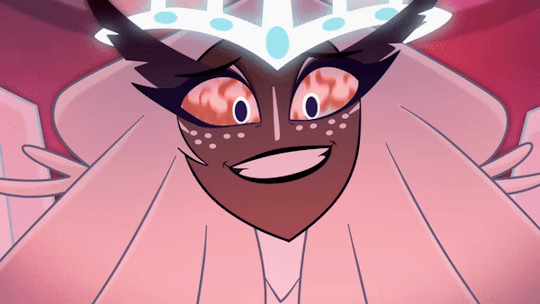
Sera: I thought, since I'm older
It's my load to shoulder
Sera is Adam's authority figure, as she is the only one Adam shows respect for. He asks for her validation and is ashamed after disappointing her. Considering Adam was created by the angels, it is easy to infer Sera is probably the closest thing he has to a mother. This also ties with Sera's overall role in the narrative, where she is framed as a parental figure to Emily and to the other angels and souls:

Not only that, but her parenting style seems rooted in the determination to protect those in her care, no matter what:
Sera: It is my position as the head Seraphim to protect our people at all costs.
Even if she has to lie to them:
I wanted to save you, the anguish it takes to
Do what was required
Or if others end up hurt in the process:
Sera: Heaven needs us, Emily. Everyone looks to us… and we can't doubt ourselves or worry about the fates of demons when we have our own souls to protect.
She keeps Emily and the rest of Heaven in a Gilded Cage and chooses to exterminate the Sinners. In a sense, she too sees the world in black and white, just like Adam. Her loved ones. All the others. This attitude is present in her relationship with Adam too, as she enables him. Some examples:
She gives Adam permission to lead the exterminations. Even if Sera thinks killing Sinners is necessary, there is no reason to entrust it to Adam, who has a very obvious grudge against Lucifer.
He lets Adam boss around the exorcists and mistreat them. Like he did with Vaggie. In general, Sera gives him no rules, if not a generic "do not embarass me" one. And even then, Adam faces no consequence after he reveals the secret.
Sera is angry at Adam's cruelty towards Charlie and reproaches him for targeting the Hazbin Hotel. Still, this is all she does. She could have stopped Adam from attacking the hotel. And yet, she only makes a single remark.
In general, Sera gives Adam free reign and even fulfills all his cruellest requests. This is made clear during Charlie and Adam's questioning.
Since the beginning, Charlie is set up to lose and the seating arrangement shows it. Sera and Emily are at the very top, as they are the judges. Below them there is the jury and then there are the two sides. Still, Charlie and Adam are not at the same level. Adam is higher, while Charlie is at the very bottom.
Sera sustains Adam's petty objection:
Adam: Objection, lame and unoriginal.
Sera: Sustained. No further dictionary references please.
But she is about to refuse Charlie's request and only agrees to it because of Emily:
Charlie: Angel will make good decisions, come on! We have to keep watching! Please?
Sera: sighs Yeah, I don't know.
Emily: Yeah, let's give him a chance.
Sera: Very well, the court will allow it.
Finally, when Adam reveals Vaggie's secret (which is irrelevant to the matter at hand), Sera allows it to happen:
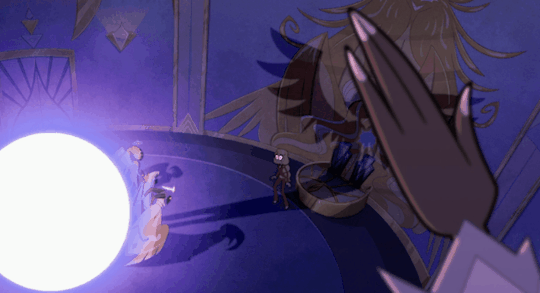
She is the one projecting Vaggie's angelic shadow on the wall. Once again she enables Adam's cruelty, instead of stopping it.
in short, Adam is a person who ascends to Heaven, but once there he spends millenias without anyone questioning or disagreeing with him. All his self-serving fantasies are fulfilled and he is never punished nor called out. As a result, he clearly becomes complacent and grows worse:
Lucifer: So, this is what you been up to since Eden? Gotta say, you've really let yourself go, buddy.
Lucifer's taunt mostly references Adam's physique. Still, this is metaphorically true for Adam's soul, as well. In the end, Adam regresses in Heaven, instead of evolving. Moreover, he never addresses nor solves the key event, which defined his life.
LUCIFER AND LILITH

Adam: You judging me? You're the most hated being in all of creation!
Adam's sense of self is clearly warped by what(ever) happened in Eden. Specifically, he is hurt that both his relationships with Lilith and Eve ended up badly (apparently). This is why:
He overcompensates by being overly masculine. He insists he is THE MAN and keeps blubbering about his love adventures. And yet, he has still no wife, that we know of.
He projects his own feelings on Lilith and Lucifer, to the point that thousands of years later, he chooses "messing their home", as his hobby. Specifically, he tries to steal Lilith away (through their deal) and to make Lucifer as miserable as possible ( which is why the King of Hell sends Charlie to meet Adam at the very beginning - he doesn't want to deal with the Exorcist).
This behavior is mirrored in how he treats the Princess of Hell too.
On the one hand Adam associates what he considers Charlie's positive traits with Lilith:
Adam: To think someone as worthless as you landed Lilith's little hottie. 'Grats on that I guess.
On the other hand Adam links what he believes to be Charlie's negative traits with Lucifer:
Adam: Risking your immortal life for sinners? That's some crazy shit, even for Lucifer's brat!
So, it is implied he still wants Lilith and despises Lucifer. These emotions are mirrored in his design, specifically his horned mask:
The horns ironically show that Adam was cheated on by (both?) his wife(s)
The horns give him a demonic-like appearance, which may be just another way Adam tries to appear more badass than what he is. All while trying to look more like a demon (Lucifer) to begin with
In other words, Adam is nothing, but a man scorned. Even moreso he is a person, who deep down could never really like himself. Hence why he chooses to wear a mask 24h/24h. Adam wants to be either a Demon or a God, but deep down he is just the Man. Ironically, this is what he could never truly accept about himself.
ADAM- A MAN

In the final fight, Adam is unmasked and we get a glimpse of his real self. What is he like? His design is far more average and human-like than other angels and demons. It is even inspired by his real voice actor, apparently. Why is that so? Because deep down Adam is no-one special. He is just a dude. He is the man. Not even that. He is a man. A person.
Sadly, though, he refuses this truth and tries to be more:
Adam: I started everything on Earth! All of mankind came from these fucking nuts! You all should be worshipping me, you ungrateful, disgusting, fucking losers-
He tries to be God and in this way he becomes worse than a Demon. He dies pathetically, after refusing mercy:
Adam: No… you don't get to end this! I'm fucking Adam! I'm the fucking man, and you're just some fucking clown or something!
He sees Lucifer as his enemy, but the King of Hell barely registers his presence and only considers him in relation to Charlie. His true opponent turns out to be a small woman of low status. And even she barely considers him as someone worthy of her attention.
And yet, Adam is still a man and he shows humanity in death:
Lute: NOOOO! Sir! Sir! Stay with me sir! ADAM!
Lute is his one genuine bond and probably the only person who earnestly makes him happy.
If only he could have pursued his humanity, he might have not turned into a monster. He might have developed a healthier sense of self and could have become happier. Instead, he could never love himself for being just a man and has spent eternity trying to be someone different.
HEAVEN ISN'T MEANT TO SUCK A LOT
Adam embodies the anti-theme.
Charlie thinks that everyone can redeem themselves:
Charlie: If I can show them the dream I've dreamed
That any soul can change!
Then they will know everyone can be redeemed
From the evil to the strange!
Adam thinks nobody truly can:
'Cause Hell is forever
Whether you like it or not
Had their chance to behave better
Now they boil in the pot
Charlie tries to grow into her own person:
Gotta come into my own
Gotta come into my throne
Gotta take charge and defend my only home
Adam turns himself into an idol:

The golden exorcists bring to mind the golden calf from the Bible.
Charlie thinks happiness and beauty can be found even in Hell:
I can hear all their stories
The lost and displaced
And I know that they're more of an acquired taste
But if I open the door and I give them a place
At my Hazbin Hotel
It'll be a happy day in Hell!
Adam can't find happiness and beauty in Heaven and his only source of joy is knowing others suffer more than him:
Fuckin' Hell is forever
And it's meant to suck a lot!
And yet, Hell might be meant to suck a lot, but Heaven shouldn't:
St. Peter and Emily: 'Cause every single day in Heaven is a happy day
Welcome to Heaven
Still, Heaven could not make Adam happy. And if Heaven can't make its own people happy, then what is the point of such a Kingdom?
Sera: It's your position to keep them happy and joyful.
Emily: How can I bring joy when I now know we are bringing misery to thousands of innocent people?
Adam is a character that embodies Heaven's problems, not only because he is an evil monster, but even moreso because he is an unhappy and unsatisfied man.
Here are my two cents on him :D We'll see if he comes back and manages to get some development!
Thank you for the ask!
#hazbin hotel#hazbin hotel meta#adam hazbin hotel#hazbin adam#my meta#asksfullofsugar#anonymous#sera hazbin hotel
106 notes
·
View notes
Note
What do you think about You Don't Know and other Hazbin Hotel songs?
Hi!
I love the songs in Hazbin Hotel and You Didn't Know is an absolute banger!
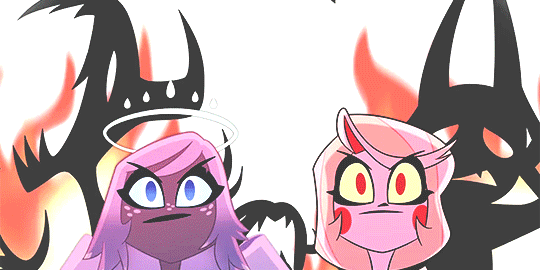
It is also one of my favourite songs when it comes to symbolism and themes. So here it comes a short analysis.
You Didn't Know explores the themes of ignorance, knowledge and questioning, as it is introduced by this exchange:
Charlie: Wait… none of you know what gets someone into Heaven?
Sera: This questioning stops now. We know when a soul arrives, we know when they pass divine judgment, it is our job to ensure these souls are safe.
The angels have no idea why a soul is considered worthy of Heaven, which angers Charlie. Still, Sera insists it is not their place to know and that they simply must accept divine judgement. However, this idea is questioned by both Emily and Charlie:
Emily: But she was right, Sera
She showed us a soul can improve
He saw the light, Sera
Checked all the boxes that you said would
Prove a person deserves a second chance
Now we turn our backs, no second glance?
Charlie: It's not fair, Sera
Vaggie: Careful, Charlie, keep a cool head
Charlie: No! Don't you care, Sera?
That just because someone is dead
It doesn't mean they can't resolve to change their ways
Turn the page
Escape infernal blaze
The two princesses point out how unfair the current system is and put some pressure on the angels. However, they too are still naive, which is why they get called out themselves.
By Sera:
Sera: It's not as simple as you think
Not everything is spelled in ink
Sera: I 'm sure you wish it could be so
But there's a lot that you don't know
And by Adam:
Adam: Gotta say, I can't wait to
Come down and exterminate you!
Emily:What are you saying?
Let me get this straight
You go down there and kill those poor souls?
Charlie: You didn't know?
Adam: Don't you act all high and mighty
Did you ever think your little girlfriend might be a liar?
Vaggie: Don't, Adam, please!
Adam: What's the fuss?
Why hide the fact that you're an angel
Just like us?
Emily and Charlie are ignorant when it comes to their loved ones. Specifically, they ignore the role of both Sera and Vaggie in the exterminations. They don't know Sera and Vaggie's shadows:
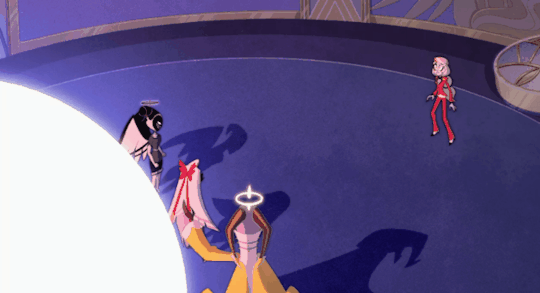

Still, this song has the characters' secrets come out, so that they can be dealt with. In future episodes we see Hell and Charlie do so, whereas Heaven and Sera refuse to. This is why season 1 ends with Hell's victory.
Still, why does Sera refuse to accept the truth? What is it that scares her so much?
Sera: They were uprising, Emily. It is my position as the head Seraphim to protect our people at all costs.
Sera fears the order might break, which could result in her loved ones suffering. In this sense, she is similar to Carmilla:
But if anyone knew, then all of Hell would rise to war
And who's to say who'd survive the fray?
I might lose the ones that I was killing for
That said, even if it is only temporary, Heaven's order is indeed lost throughout the song. This is shown by two visual motifs:
The metaphorical use of heights
The use of colors, especially blue and red
WHO HAS THE MORAL HIGH GROUND?
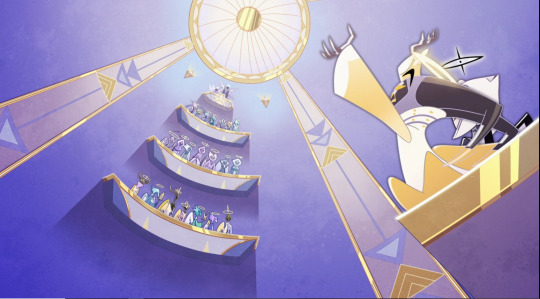
The seating in the courtroom is organized, so that it mirrors the characters' perceived morality:
Sera and Emily, as Seraphims and judges are at the very top
The other high ranking angels are the jury, so they are just below the two seraphims
Adam, Lute, Charlie and Vaggie are the two parts debating, so they are below the judges and the jury. Still, they are not on the same level. Adam and Lute are above Charlie and Vaggie.
This arrangement shows that Sera has no intention to be a fair judge, as she has already decided the Exorcist Adam has the moral high ground on the Princess of Hell. He is an angel and she is a demon. He is the first virtuous soul and she is Lucifer's daughter. He embodies the status quo, while she is trying to change it. So, Sera has already decided to favor Adam over Charlie. In other words, the moral high ground highlights not morality, but the influence Heaven has over Hell. It is nothing more, but the embodyment of their power dynamic.
Despite this, as the song starts things change in multiple ways:
1- Emily steps down
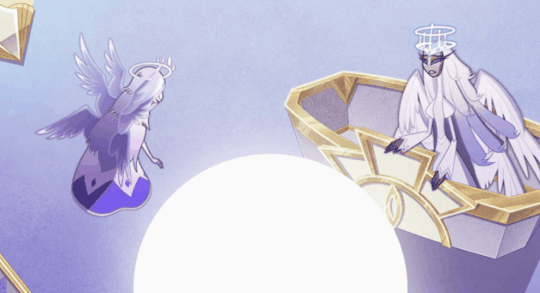
Emily empathizes with Charlie and gets down off the pedestal Sera has built for her. She is still above Charlie and Adam, but she invites the other angels to show mercy, to be just. This is because Emily strongly believes Heaven is a place where virtue and morality reign.
2- Adam and Lute look down on Charlie

Adam and Lute make their case and claim Hell is forever:
Adam and Lute: Did you forget that "Hell is forever"?
As they sing this part, they stand on the magical orb and look down on Charlie. They have the upper hand and judge her and the other demons as creatures inferior to angels. At this point, though, Adam flies down to threathen Charlie:

By doing so, he reveals the existence of the exterminations and shows that he himself is no different from a demon. So, Adam and Charlie are on equal footing.
3 - Emily reaches Charlie

The reveal of the Exterminations shocks Emily, who reaches the floor to better look at the destruction Heaven is causing. Her idealistic vision of Heaven gets shattered, so she is forced to re-evaluate the system and the current order. She stops positioning herself as higher than Charlie and goes down to better see things from her perspective.
4 - Sera flies down

Sera panics and hurries to Emily to convince her that what she has done is for the greater good. She is forced to step down and to confront the younger Seraphim on the floor:
Sera: You have to listen
It was such a hard decision
I wanted to save you, the anguish it takes to
Do what was required
Still, Emily refuses Sera's explanation and calls her out:
Emily: To think that I admired you
Well, I don't need your condescension
I'm not a child to protect
Was talk of virtue just pretension?
Was I too naïve to expect you
To heed the morals you're purveying?
As she does, she flies higher than Sera because she is showing more morality than her mentor:

5- Charlie and Emily gain the moral high ground

As Charlie and Emily sing together in anger and frustration, they jump on the magical orb. Their pose mirrors Adam and Lute's one, but their point is the thematical opposite:
Charlie and Emily: If Hell is forever, then Heaven must be a lie!
Adam and Lute claim "hell is forever", whereas Charlie and Emily answer that "if hell is forever, then heaven must be a lie". Not only that, but they say it looking down on Sera, who is supposedly the higher ranking angel and the judge.
Charlie starts the questioning at the very bottom, but in the climax she gains the upper hand. Sera should be at the very top, but in the end she is reduced to look up to the two girls from the floor.
The questioning starts as a farce and a demonstration of political power. However, Charlie's determination and Emily's sense of justice make it the real deal. Hypocrisy disappears and the truth becomes visible to everybody. Even if just for a moment.
6- Sera takes back control
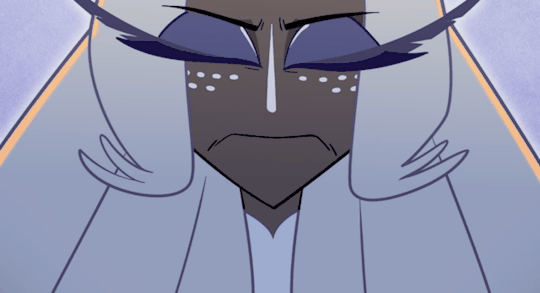
Sera uses Adam's reveal about Vaggie to re-assert order over the courtroom. She and Emily fly back to their seats and Sera is free to be the judge again. Her final decision is the one she was determined to make in the beginning:
Sera: I'm sorry… but this court finds that there is no evidence souls in Hell can be redeemed.
Sera refuses Charlie and Emily's pleas and goes back to the pre-established order.
RED DEVIL AND BLUE ANGEL
Charlie and Emily unmasking the truth about Heaven and Hell is highlighted also by the way red and blue are used throughout the song. In general, Hell and Heaven are color-coded. Hell is red and Heaven is blue. For example, Charlie and Vaggie wear red, whereas St Peter, Sera and Emily wear blue:

Not only that, but Sera and Emily's wings have blue details and shades. Lucifer is a Seraphim too, but his wings are red inside, as he is the titular devil:

That said, You Didn't Know breaks this color scheme to show how angels like Adam, Lute and Sera are behaving like devils. This clip of Sera makes it clear:

Hell's flames are mirrored in her eyes and make her look scary, when she is trying to be reassuring. A stark contrast with the blue and gold idealized imagery Emily has of her:

By the moment Charlie and Emily state their powerful come-back the colors are basically mixed. Just like the Princess of Hell (red) and the Youngest Seraphim (blue) stand together and share the same moral vision:
Charlie and Emily: If angels can do whatever, and remain in the sky
The rules are shades of gray when you don't do as you say
When you make the wretched suffer just to kill them again
Hell and Heaven are not red (black) and white (blue), but have shades (of gray). Just as Charlie and Emily sing this, the world around them changes to prove them right.
The two girls break the system and show clearly that:
Charlie is the one pursuing morality, as she is trying to protect people
Good and Evil are not so easily defined, as the angels behave like demons and demons show positive traits and virtues
Unluckily, this isn't enough to change things, as Heaven is stuck in their own rules:
Lucifer: Hohooo boy, Heaven, is not exactly as carefree as you might think. Yeah, they have rules, lots of rules, and they aren't very open minded as you'd hope.
A QUESTION TO BE POSED
The debate between Charlie and Adam is about the possibility or not to redeem souls in Hell. Deep down, though, it is really about something much more basic. Is it alright to question things? Every character has their own viewpoint on the matter:
Charlie: Well, if you know so much, what do you think it takes to get into Heaven?
Adam: Uhhh… well, uh… then why isn't he here then? Hm?
Emily: Yeah, why isn't he here?
Lute and Adam: There's no question to be posed
He's unholy, case closed
Charlie and Emily are genuinelly asking questions. They wanna know why some spirits end up in Heaven and why others do not. Adam and Lute, instead refuse to investigate things. Adam's question isn't real and it is just rhetoric used to prove a point. Lute directly states there is nothing to question. Charlie and Emily embody the theme, whereas Adam and Lute represent the anti-theme.
What about Sera? She is the negation of the negation, which is a thematic stance worse than the anti-theme. Charlie and Emily are ignorant, but want to know. Adam and Lute are in the dark, but they don't care to know.
Sera's sin isn't ignorance, though. It is knowledge:
Emily: Sera, tell me that you didn't know
Sera: I thought, since I'm older
It's my load to shoulder
Emily: No!
She knows about the exterminations and she knows the system isn't fair. Still, she refuses to question it. Not only that, but she prohibits others to ask questions:
Sera: Please…. if you start to question… you could end up like Lucifer. FALLEN.
She is the judge of a questioning, but doesn't allow questions. This shows how hypocritical the whole situation is. How can there be a questioning, when one can't ask questions? And if asking questions is prohibited, then the final answer will never change:
Lucifer: Heaven never listens! They didn't listen to me, they won't listen to you!
#hazbin hotel#hazbin hotel meta#my meta#asksfullofsugar#anonymous#charlie morningstar#sera hazbin hotel#emily hazbin hotel#adam hazbin hotel#lute hazbin hotel
72 notes
·
View notes
Note
do you think Ai's signature bunny has any symbolism for her character? like is ai symbolic of the animal itself?
Hello anon!
I think the latest chapter actually shows the rabbit's symbolism pretty clearly:
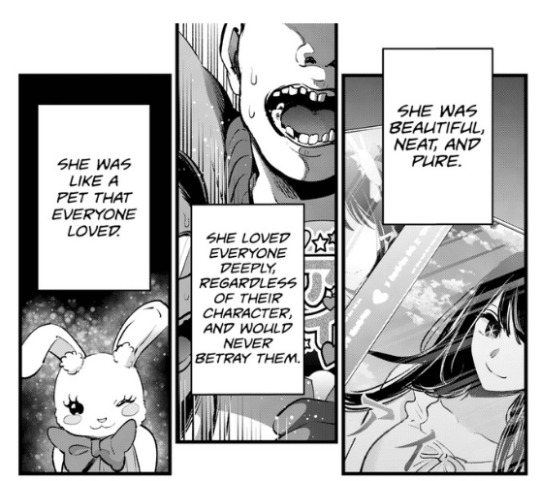
The rabbit represents Ai's idol persona. It is the mask she is forced to wear with her fans and it symbolizes innocence, purity and childishness. It is cute, but dehumanizing because it negates Ai's personhood. Not sure there is a specific reason as for why it is a rabbit and not another pet... I'll think about it!
Thank you for the ask!
56 notes
·
View notes
Note
Hi Sugar!
I was reading your analysis of the five couples you see as endgame (this one here) and I really enjoyed it! But I was wondering; how do you think that Pyrrha plays a role in Jaune and Weiss's relationship? Is it something like Cinder or something unique, or maybe nothing at all?
Hi,
thank you so much for this ask! I really really love White Knight, so asks on its structure and thematic meaning are welcome!
So, Pyrrha is 100% important, as it is Ruby. They both are key for Weiss and Jaune's relationship. Of course, I am headcanoning WK is gonna be endgame. However, even if this isn't the case, I think many of the things below will still hold true in a platonic sense :)

TRIANGLES
Let's consider these two scenes:
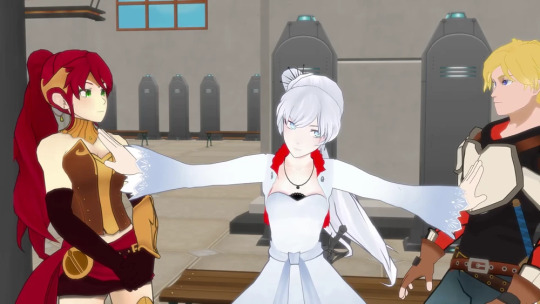
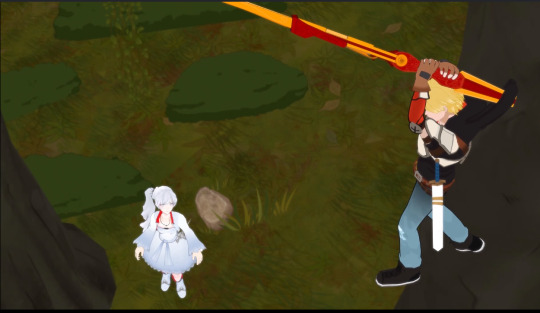
What do they have in common?
They focus on Weiss and Jaune
They involve a dynamic among three characters
They deal with the choice of a partner
Both Jaune and Weiss have a specific partner in mind. Jaune wants Weiss, while Weiss wants Pyrrha. However, the end results are different from what they expect. Weiss finds Ruby, while Jaune is chosen by Pyrrha.
Why is that so? It is a case of want vs need. Here is an extract from the above linked meta:
By this point Weiss and Jaune are pursuing a superficial dream of heroes and monsters. They figure their most perfected selves beside the "right" patner.
On the one hand Weiss wants Pyrrha to be the "knight" to her "princess":
Weiss: This will be perfect! The smartest girl in class combined with the strongest girl in class! Together we will be unstoppable!
She wants someone strong (body) that complements her intelligence (mind). She thinks that in this way she can't fail.
On the other hand Jaune wants Weiss to be the "princess" to his "knight":
Jaune: Don't worry! No need to be embarrassed! So, been hearing rumors about teams! I was thinking you and me would make a good one! What do you say?
He wants someone who is beautiful and looks frail, so he can protect her. He thinks in this way he can appear strong.
Both are wrong obviously. This is why they end up with respectively Ruby and Pyrrha as partners.
Weiss needs to realize what complements mind is not body, but heart. This is why she is paired with Ruby, who lacks physical strength, but has more than enough heart to guide Weiss. Throughout the initiation, Weiss herself has to act as a Knight by saving Ruby from the Nevermore. And later on, she needs to follow Ruby's plan (so Ruby's mind) to take down the Grimm and pass the trial.
Jaune needs to realize a real knight is not physically strong, but is wise (mind) and brave (heart). This is why he ends up with Pyrrha, who is both and challenges him in two different ways. She doesn't fit feminine stereotypes and sees Jaune's value not in his superficial traits, but rather in his willingness to help. Throughout the initiation, Jaune shows this by staying behind to lead others into kiling the Grimm.
In short, Jaune wants Weiss, but needs Pyrrha, while Weiss wants Pyrrha, but needs Ruby. Let's make two considerations:
1- WK is built on "triangles". A triangle is a trope where one character wants another, but this other wants a third person, who is instead interested in the first. This is obvious in Weiss, Jaune and Pyrrha's dynamic. Weiss wants Pyrrha, who wants Jaune, who wants Weiss. The song Dream Come True strengthens this idea, as Pyrrha sings to Jaune, while throwing shades at Weiss.
Obviously, the triangle is quickly solved. Weiss warms up to Ruby as her partner and Jaune gives up on Weiss and falls for Pyrrha.
Still, this early setting is important. As a matter of fact RWBY plays with romantic archetypes in its ships. Two examples:
Renora deconstructs and reconstructs the childhood friend to lover trope. Usually, there is a character, who falls first and supports the other, until their love is reciprocated. Here, though, Nora eventually realizes that to stay with Ren, she needs to grow as her own person. Both partners need to change, so that their dynamic can transform.
Bumbleby uses a harem to explore Blake's developing interiority and animus. Each one of Blake's love interests tie into her sexuality, inner maturity and fairy tale symbolism. By going through Blake's "harem", we get many different relationships that help Blake explore herself, until she is ready for Yang.
In short, RWBY gets inspiration from love tropes, but it makes them thematic. The same can be said about WK and triangles. The point isn't that W,J and P or W, J and R are in romantic triangles, but rather that these characters make 2 thematic trios. In other words, Pyrrha and Ruby foil Weiss and Jaune and are both important for their relationship. Similarly, Weiss and Jaune's bond is key for their respective dynamics with Ruby and Pyrrha.
2- Weiss and Jaune's want vs need struggle applies to more than just the choice of a partner. It actually defines their whole arcs.
Weiss wants to honor her family legacy, but needs to define herself outside the Schnees. Jaune wants to be a strong hero, but needs to love himself for who he is. That said, Weiss and Jaune will both realize their early want. Weiss is gonna define a new legacy for the Schnee Family. It is just that the SDC is no more a part of it. Jaune is gonna bloom into a hero. It is just that true heroes are not always the strongest. Both are getting their want, but in an unforeseen way.
The same holds true for their preferred partners. Weiss is getting Pyrrha (yes, really) and Jaune is getting Weiss. Confused? No worries, it will all be clear in a minute ;) For now, let's analyze both Whiterose and Arkos and what they mean for White Knight.
WHITEROSE - HUNTRESSES
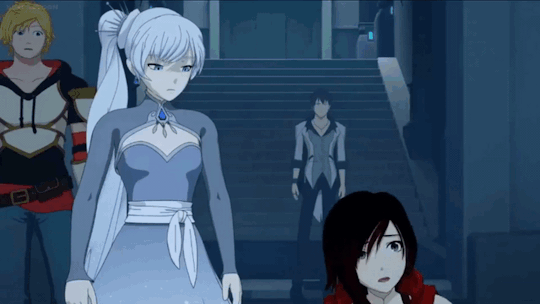
Weiss and Ruby are each other's "hunting" partners. They fight side by side to save lives and pursue the same dream of becoming Huntresses. This is the thematic heart of their relationship, which is mirrored in their intertwined allusions. As a matter of fact there is a Hunter in both Snowhite and Little Red Riding Hood.
On the one hand Snowhite's Hunter is weak. He wants to help Snowhite, but all he can do is not to kill the princess and to leave her alone in the woods. On the other hand Little Red Riding Hood's Hunter is the hero of the fairy tale. He kills the wolf and saves the protagonist and her grandmother. What does it mean for Whiterose?
It ties in how Ruby inspires Weiss. Let's consider this scene:
Ruby: Weiss! Go for its belly! There's no armor underneath...
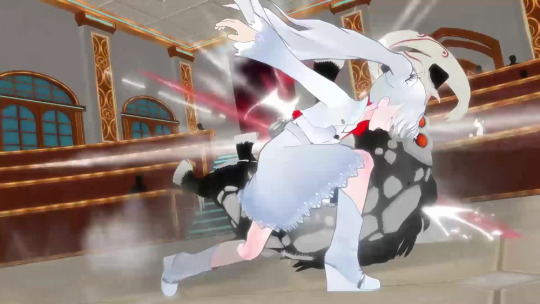
In the fairy tale, the Hunter kills a boar to help Snowhite. It is his one good deed. Similarly, Weiss kills a Boarbatusk with Ruby's help to act as a true Huntress. This is why the Grimm later on becomes an avatar symbolic of Weiss's Huntress side:
Port after Weiss kills the Boarbatusk: Bravo! Bra-vo! It appears we are indeed in the presence of a true Huntress-in-training!
Weiss in the aftermath of the party where she summons the Boarbatusk for the first time: The Schnee family legacy isn't yours to leave. It's mine, and I'll do it as a Huntress.
The metaphor is clear. Ruby (LRRH's Hunter) inspires Weiss (SW's Hunter) to grow into a hero. She leads Weiss towards a better version of herself:
Weiss: Just know that I am going to be the best teammate you'll ever have!
This is the perfect set-up for Weiss to eventually inspire Ruby back. For her to become the Huntress who saves Little Red Riding Hood:
Weiss: I don’t know who you think you are, but let me tell you who I am: I am the granddaughter of a hero and a child of a villain. I am a citizen of a fallen Kingdom and an heir to nothing. I will not be defined by my name because I will be the one to define it. I am Weiss Schnee, and I am a Huntress!
Past Ruby: So, are you a Huntress? Like the ones you read about in books?
Ruby: I… I don’t know…
Volume 9 offers Weiss a perfect chance. Ruby is lost and is eventually eaten by two Big Bad Wolves (Neo and the Curious Cat). However, Weiss fails:
Ruby: Don’t worry. We’ll find a way outta here and we’ll go back home. Weiss?
Weiss: It's… It’s all gone… There’s nothing left for me to go back to… Just like Beacon…
Ruby: You did the best you could for Atlas, Weiss.
Weiss: But it wasn't enough! We hatched a crazy plan that put a whole kingdom at risk, and we don't even know if we saved the Relics from… Maybe… Jaune and Winter were able to get them out, despite… everything… despite us…
Several times Ruby notices Weiss's pain and tries to comfort her. Several times Ruby is similarly struggling, but Weiss can't support her. Weiss herself explains why:
Weiss: Maybe she didn’t feel like she could… Ruby has always been the one to get us through the hard times. We say things like “We believe in you”, “We can count on you”. I know we mean well, but…
Weiss idealizes Ruby too much and downgrades herself. She thinks Ruby can lead them all, but Weiss has actually grown enough to guide others too. She shows it by helping Jaune:
Weiss: I think you’re asking too much of yourself. We’ve been telling ourselves that failing means we’re no good. But I can guarantee even the best Huntsmen in history… they’ve all lost. But they were still incredibly brave… and good.
Weiss's speech here is an inversion of her initial dialogue with Ruby. There she feels her best is not enough and she drowns in self-hate. Here, she realizes that even if she and her friends lose, they are still good people.
It is a game of mirrors. She fails to see Ruby because she can't help herself. She sees Jaune and saves herself by helping him.
In short, Weiss fails with Ruby, but succeeds with Jaune. I think this is key for Weiss, Ruby and Jaune's dynamic.
At Beacon, Weiss is too immature for Pyrrha and doesn't see Jaune as a romantic partner. She needs Ruby to grow as a person.
In the Ever After, Weiss depends on Ruby too much and needs Jaune (who is Pyrrha's legacy) to develop.
So, she grows with Ruby until she and Jaune are ready for each other. Now, her bond with Jaune is helping her to bloom in the friend Ruby needs. It is a virtuous cycle where both Ruby and Jaune help Weiss mature, so that she can be the best partner ever. Platonic for Ruby and romantic for Jaune (imo).
If this turns out true, then Weiss's Nevermore might be tied to both Ruby and Jaune (other than to her team and family).
It is already strongly associated with Ruby, as team RWBY killed the Grimm together. Moreover, Weiss first tries to summon it to save her partner:

Later on, she materializes its wings while fighting with her team minus Ruby:
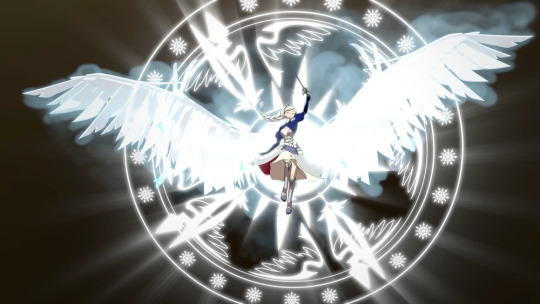
And eventually conjures the whole thing, as Ruby comes back:

It is possible the Nevetrmore will be linked to Jaune, as well. After all, he is the one who calls Weiss "Snow Angel". The Grimm is meant to show that Weiss can indeed be an angel to others:

Ruby and Jaune are equally important for Weiss. She needs Ruby to end up with Jaune and she needs Jaune to be the Huntress Ruby deserves. At the same time, Ruby and Jaune represent two sides of Pyrrha, the partner Weiss initially wants.
I usually don't use spinoffs, but I think Ice Queendom makes it pretty clear:
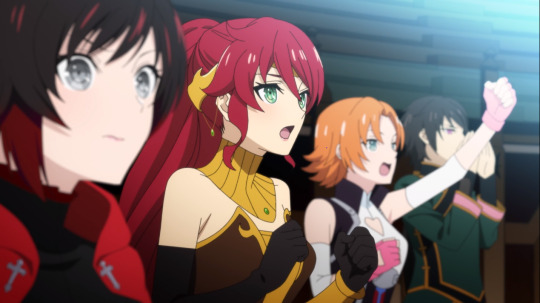
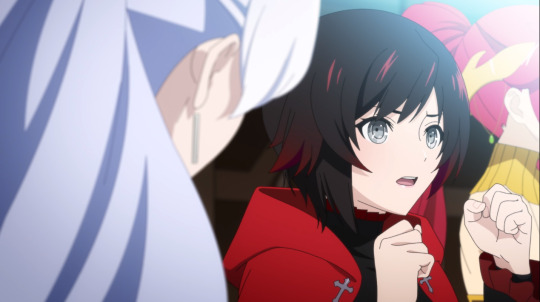
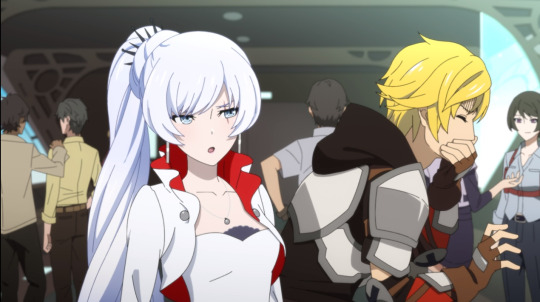

Weiss looks at Pyrrha in awe, but the ones she needs are Ruby and Jaune.
Ruby is a paragon, just like Pyrrha. She has both mind and heart, like our Achilles. The main difference is that Ruby is younger, so she lacks experience and fighting prowess. Weiss needs Ruby for 2 reasons:
She needs to reconcile with her inner-child that has been suppressed by Jacques's abuse:
Weiss: I always wanted bunk beds as a kid.
She needs to see what's important is the heart (Ruby's idealism) and not the body (Pyrrha's fighting skills).
What about Jaune? In which way is he Weiss's Pyrrha? Let's discover it.
ARKOS - ANIMA

Pyrrha is Jaune's partner and his love interest. She is also the key character of Jaune's story, as his allusion makes clear. Jeanne d'Arc is a maid whose actions are inspired by God. Similarly, Jaune is a knight able to perform miracles:
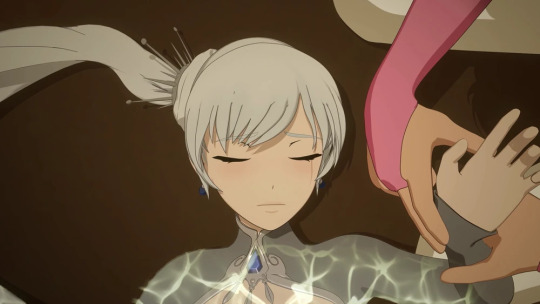
Whose hands and resolve are guided by his Goddess:
Jaune: No. I don't think I'm healing her. Our Aura heals our bodies. It feels… it feels more like I'm using my Aura to amplify hers!
Nora: Wait, aren't you worried about running out?
Jaune: Pyrrha once told me I've got a lot of it. I still believe her.
Pyrrha is Jaune's deity and inspiration:
Pyrrha: For it is in passing that we achieve immortality. Through this, we become a paragon of virtue and glory to rise above all. Infinite in distance and unbound by death, I release your soul, and by my shoulder, protect thee.
So, Jaune's arc is about:
becoming like Pyrrha
overcoming Pyrrha's death
Still, how can Jaune become like Pyrrha, while leaving her behind? Aren't these 2 objectives contradictory? Only superficially. What Jaune must do is to integrate with his anima. In Jungian Psychology, the anima is the feminine part of a man. It is a side, which is often suppressed, but that needs to come to light for the man to truly mature into a balanced person. A person, who can have positive and healthy romantic relationships.
This is the crux of Jaune's character. He is inspired by Jeanne because she is both maid and knight. Similarly, Jaune must transform into a knight, who is also a maiden. A hero who overcomes his toxic masculinity by accepting his feminine parts. The only way for him to succeed is to integrate with his anima, who is represented by Pyrrha. From the first meta linked:
Jaune's journey through the anima is well conveyed through 4 stages, which stand for archetypical female figures. Each one represents a different level of maturity:
Eve is the mother - The boy has no romantic attachment and sees the woman as a source of protection and nourishment
Helen is the seductress - The boy feels romantic attraction and sees the woman as a talented individual, but pays no attention to her spiritual or inner life
Mary is the virgin - The boy feels mature love and sees the woman as a paragon of virtue, but pays no attention to her negative traits
Sophia is wisdom - The boy is ready for a relationship with a woman as an equal partner and sees the feminine as a source of wisdom with no need to objectify the woman anymore
These phases describe Jaune's general approach to women and how it changes. He arrives at Beacon looking for a girlfriend because that is what a man should do, which in itself is a very childish behavior. Then he grows to see the girls around him as powerful individuals, but he can't go behind the surface. This is true for Weiss, but also for Pyrrha, whose struggles he ignores. After her death, Pyrrha becomes an ideal, but she isn't the only one. For example, Jaune believes Weiss and Ruby can save Pyrrha from Cinder and later on he keeps idealizing them. In volume 9, he learns to let go of his idealization and to see others as their own people. He is stepping into Sophia (wisdom).
Pyrrha is Jaune's anima in the sense she represents the feminine side Jaune needs to acquire. At the same time, the way Jaune's relationship with Pyrrha changes highlights the boy's maturation:
Eve > Jaune is nurtered and protected by Pyrrha to the point he even compares her to his mother:
Jaune: Bring it on, Ice Queen! I'll have you know that I have been told that I am a natural born leader!
Weiss: By who? Your mother?
Jaune: A-and Pyrrha!
Pyrrha: Hello again!
He feels no attraction towards her.
Hellen > Jaune grows attracted to Pyrrha, but struggles to understand her interiority. For example, he is unable to see her feelings for him or to fully grasp her inner conflict about the Maiden powers:
Pyrrha: I don't know if I can do it.
Jaune: Of course you can. The Pyrrha Nikos I know would never back down from a challenge. And if you really believe it's your destiny to save the world… you can't let anything stand in your way.
Despite Jaune's intentions, this doesn't bring relief. Instead, Pyrrha looks absolutely shattered, covering her mouth as she begins to sob.
Mary > Jaune idealizes Pyrrha and sees her as a paragon of heroism and virtue. He tries to emulate her and to become a hero like her:
Jaune: I think… I think she knew she wasn't going to win. That she might not come out alive. But… she also knew she was the only one that could try.
Ren: So she did.
Nora: Maybe we should too.
Jaune: Yeah, we should.
This idealization is heartwarming, but it's what's keeping Jaune stuck. He can never overcome Pyrrha's death if he transforms her into an idol. Not only that, but it is something Pyrrha herself would not have wanted:
Pyrrha: I've been blessed with incredible talents and opportunities. I'm constantly surrounded by love and praise, but when you're placed on a pedestal like that for so long, you become separated from the people that put you there in the first place. Everyone assumes I'm too good for them. That I'm on a level they simply can't attain. It's become impossible to form any sort of meaningful relationship with people. That's what I like about you. When we met, you didn't even know my name. You treated me just like anyone else. And thanks to you, I've made friendships that will last a lifetime. I guess, you're the kind of guy I wish I was here with. Someone who just saw me for me.
Pyrrha is drawn to Jaune because he is the only one who does not put her on a pedestal. However, after her death, this is what our Knight does to an extent. So, a good resolutioin would be for Jaune to see Pyrrha for who she is. A brave girl Jaune loves and who dies too soon. This is the only way Jaune can forgive both Pyrrha and himself. This is where Weiss (Sophia or Wisdom) steps in:
Curious Cat: I am talking about you, Wise Huntress.
Let's compare these 2 scenes:
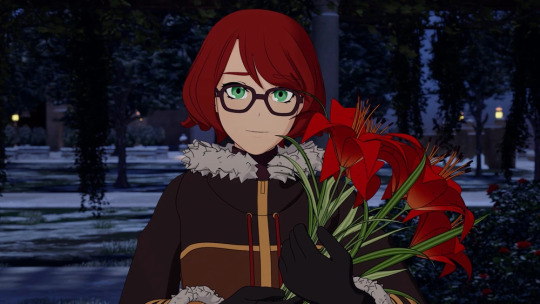
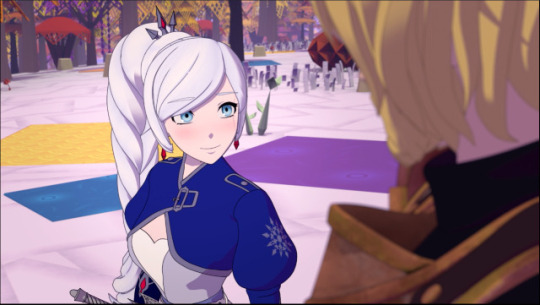
Both have Jaune struggling with grief and self-hate. In the first one, he has just lashed out at Oscar out of anger for Pyrrha's death. In the second one, he has just lashed out at Ruby out of anger for the paper pleasers ascending. Both times, he is doubting himself. Both times, a woman comes and reassures him. The first time, Pyrrha's mother/ghost/vision encourages him to keep going. The second time, Weiss encourages him to let go. Both scenes end with a family like re-union (team JNR and team RWBY).
Not to count there are mystical leaves flying around:

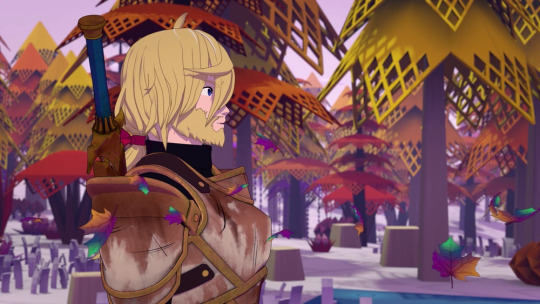
Someone coming back in an unexpected form:
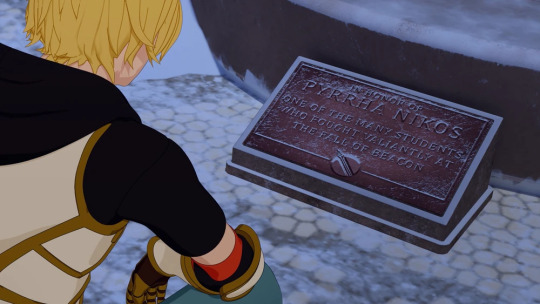

And a giant stone:


Both situations emphasize that even the best heroes fail. Still, they give this lesson a different spin. Pyrrha teaches Jaune the importance of going on despite the risk of failure. Weiss teaches Jaune the necessity of forgiving one-self for failure. Pyrrha acts as Mary and guides Jaune towards an ideal. Weiss acts as Sophia and leads Jaune towards his real self.
The final stage of the anima is about seeing one-self and the other clearly, both strengths and weaknesses. The romantic partner stops being objectified and is simply accepted as their own person. So, Jaune's final step towards self-actualization will be to let go of Pyrrha's idealized memory and to embrace Weiss, for whom she really is. This conclusion would be perfect for his bond with both girls:
Jaune would overcome Pyrrha's death by stopping his idealization of her. He would put Pyrrha down from her pedestal and love the girl in all her beauty and contradictions. He would finally be able to understand her fully, which is what he fails to do at Beacon.
Jaune would love Weiss for her true self, instead than her superficial beauty. He would appreciate the girl because she shares some of Pyrrha's best qualities, like her bravery and her heart, which is that of a Huntress. He would accept some of Weiss's most masculine traits, that he initially ignores.
In other words:
Jaune needs to mature by Pyrrha's side to be ready for Weiss
Jaune needs Weiss's help to face the memory of Pyrrha properly
As a matter of fact only by seeing Pyrrha clearly, Jaune can fully integrate with her, which means he can fully bloom into a hero like Pyrrha. Not only that, but he can succeed, where Pyrrha fails. What are Pyrrha's 2 objectives?
Pyrrha: I've always felt as though I was destined to become a Huntress - to protect the world
Nothing, even death
Could separate our souls
'Cause you're my final goal
Pyrrha's 2 destinies are to be a hero and to be in love. She fulfills them both tragically. Jaune will fulfill them both in a more positive way.
He is guiding Cinder towards her destiny, by conveying the meaning of Pyrrha's words (heroism)
He is getting his happily ever after with Weiss (love)
In other words, Jaune is fulfilling Pyrrha's legacy thanks to Weiss and is ending up with Weiss thanks to Pyrrha.
THE BEAUTY OF WHITE KNIGHT
Let's summarize Weiss and Jaune's arcs.
Weiss's story is about overcoming her father's abuse. This starts with her affirming who she is outside her surname, goes on with her healing her family and it ends with a new legacy and a new romantic interest. The Schnee name is dirtied when Willow is caught in an abusive relationship with Jacques. Their marriage twists Weiss's perception of romantic relationships:
Weiss: All my life, boys have only cared about the perks of my last name.
So, it would be the cherry on top of Weiss's arc for her family to be reborn together with a new love. A bond with someone who genuinelly likes Weiss:
Jaune: It's Weiss. I'm completely head-over-heels for her, and she won't even give me a chance. She's cold, but she's also incredible. She's smart, and graceful, and talented. I mean, have you heard her sing? I-I just wish she's take me seriously, y'know? I wish I could tell her how I feel without messing it all up.
Jaune's story is about loving himself for who he is, as a whole. Strength and weakness. Masculine and feminine traits alike. The path to do so is to integrate with Pyrrha and become the hero she was. At the same time, he needs to work through his grief over Pyrrha's death. Both goals can be celebrated with the beginning of a fresh relationship. A bond with someone Jaune has always admired. That would be Pyrrha's final gift to him:
Pyrrha: Then do it. Tell her exactly what you said. No ridiculous schemes, no pick-up lines. Just… be honest. You can't get it wrong if it's the truth.
This is why I personally don't believe either Weiss or Jaune ending up single fits their stories. Weiss deserves a romantic partner who loves her, so she can write a story different from her parents'. Jaune needs a new relationship to give both himself and Pyrrha closure.
In conclusion, I personally think both Whiterose and Arkos are intertwined with White Knight.
Arkos especially is a part of White Knight. White Knight would not be possible without Arkos. At the same time, Arkos would lack a powerful catharsis without White Knight. They are 2 bonds that are bound to grow and develop thanks to each other.
Thank you for the ask! I hope my rambling made sense :)
#rwby#white knight#weiss schnee#jaune arc#pyrrha nikos#ruby rose#asksfullofsugar#milliethekitty27#rwby theory#rwby meta#i may be wrong of course#but here is why i fully support this ship#and in any case their relationship should get some focus :)#either romantically or platonically#it is intertwined with other important relationships after all#my meta
103 notes
·
View notes
Note
Hi! Do you have an analysis of hell greastest dad? Do you think it's worth analizing?
Hi!
Yes, I think Hell's Greatest Dad says a lot about Lucifer and Alastor. In particular, I would call it a "set-up song" in how it sets up:
Lucifer and Alastor's foiling
Lucifer's arc in the episode Dad Beat Dad
Alastor's arc (or at least it does some preparatory work)
Future plot-points through foreshadowing
In short, it isn't a song, which pays off immediately and it isn't the thematic heart of the episode (More Than Anything is). Still, it works very well by introducing ideas and conflicts that are postponed. Just like Lucifer and Alastor's rivalry isn't solved because of Mimzy's arrival:
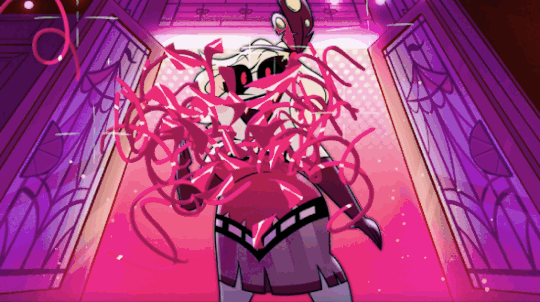
Before I start analyzing the song, here are some metas I am gonna reference in this post:
Alastor and Lucifer's foiling
More Than Anything
An analysis of Alastor
An analysis of Lucifer
LUCIFER AND ALASTOR'S FOILING: DAD LIKE ME
Hell's Greatest Dad is inspired by Aladdin's Friend Like Me.
Some examples:




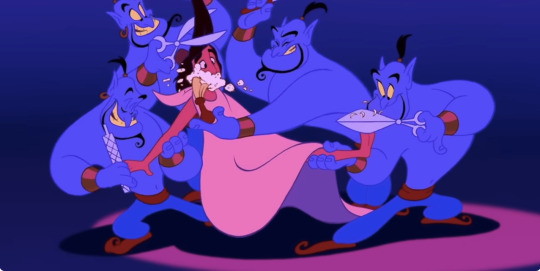

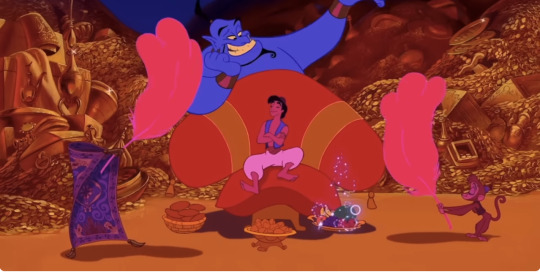

At the same time, it is a twist on the classic Disney song in two ways:
Lucifer is the geenie advertising his selling points, but Alastor, another geenie, comes and picks a fight (1/2)
The two geenies offer different and complementary things (2/2)
LUCIFER AND ALASTOR'S FOILING 1/2: LIGHT AND SHADOW
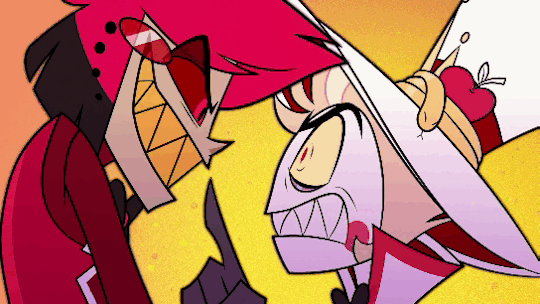
Lucifer and Alastor have opposite motifs:
Lucifer has a light motif, as his name means shining one and his powers use light
Alastor has a shadow motif, as his shadow moves on its own and his abilities employ shadows
This imagery ties with jungian symbolism. According to Jung:
The light is the persona, the mask one wears. It is the part of the self a person shows to others. It is what is out in the open and it is often an ideal image.
The shadow is what's hidden and repressed. It is the part of the self the person is unaware of or ignores. It is often what one dislikes about themselves.
Throughout Hell's Greatest Dad, Lucifer and Alastor's conflicting motifs clash with each other.
Lucifer is surrouned by gold (light):

Alastor has a purple background (shadow):
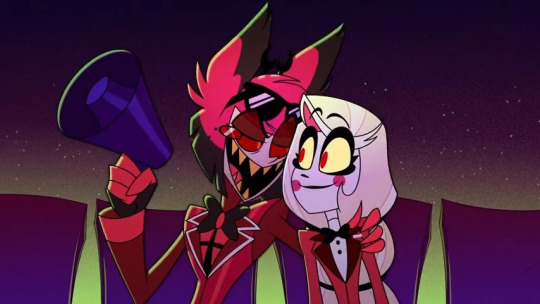
Similarly, Lucifer tries to put off a mask of perfection and power:
Lucifer: Haha! Looks like you could use some help
From the Big Boss of Hell himself
Check out Daddy's glowing reviews on Yelp
Lucifer Muppets: "Five Stars!"
"Flawless!"
"Greater than great!"
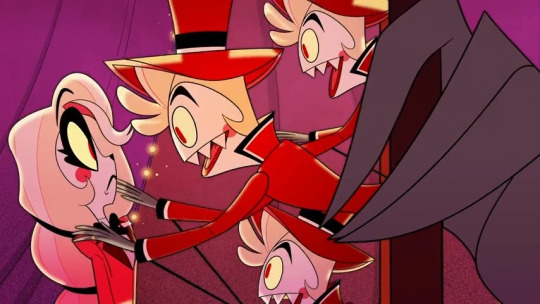
Lucifer shows Charlie his stellar reviews on Yelp, but the ones praising him are Lucifer-puppets. So, the reviews are from puppet accounts and an attempt to look better than what he is.
Alastor instead fights back by using Lucifer's hidden fears and insecurities:
Alastor: I'm truly honored that we've built such a bond
Charlie: Awww!
Alastor: You're like the child that I wish that I had
Lucifer: Uh, what?
Alastor: I care for you just like a daughter I spawned
Lucifer: Hold on now!
Alastor: It's a little funny
You could almost call me
Dad!
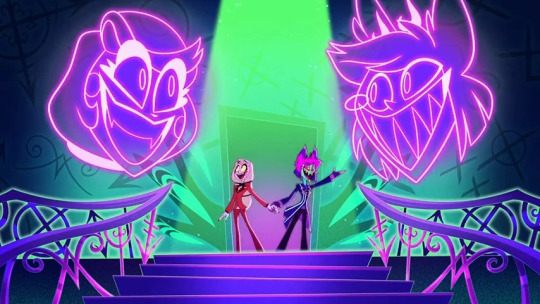
Alastor weaponizes his bond with Charlie against Lucifer. He exagerates his own contributions to the Hazbin Hotel and the closeness he has with Charlie.
At its root, both Lucifer and Alastor don't want to admit they are projecting something on the other.
On the one hand Lucifer doesn't want to face his shortcomings as a father, which Alastor brings to the surface:
Alastor: Sadly, there are times a birth parent is a dud
On the other hand Alastor doesn't want to admit he is envious of Lucifer's powers and freedom (as this episode reveals, Alastor is on a leash):
Lucifer: Who needs a busboy now that you've got the chef?
None of the two can fully overwhelm the other because neither is ready to face himself. This is why the song ends with the unexpected arrival of another character:
t's me!
It's me!
Mimzzzyyyyyyy!
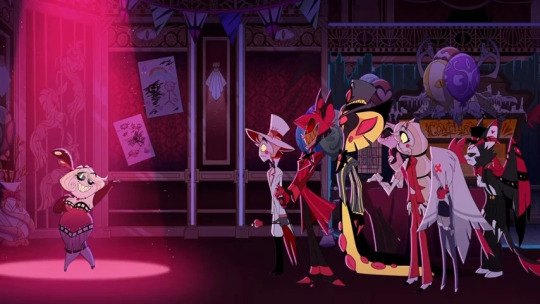
Mimzy's color scheme in the song is purple, like Alastor's. That is because she herself is linked to the shadow. Specifically, she is linked to Alastor's own shadow.
To what he is hiding, like his past:
Mimzy: Oh yeah, we go way back, ran in the same circles when we were alive. You know, this one used to frequent the club where I used to perform. He's the only one I knew who could pound whiskey like a sailor then keep up with me on the dance floor!
To what he is repressing, like his need for validation and attention:
Husk: You and I both know Mimzy only shows up when she needs something. That bitch is trouble, and who knows what kind of demon she fucked with to come running to you this time?
Alastor: it's nothing I can't handle. Don't worry Husker. Who in their right mind would cross me?
In short, Lucifer tries to get Charlie's praise and is mocked for it by Alastor. Still, Alastor himself shares a bond with Mimzy, where he uses his powers to satisfy her requests in exchange of respect. So, Mimzy takes over Alastor's song like Alastor inserts himself in Lucifer's:
Alastor: Can you butt out of my song?
Lucifer: Your song? I started this!
Alastor: I'm singing it, I'll finish it!
Lucifer: OH, YOU TACKY PIECE OF—!
Mimzy: It's me!
Yes, it's me!
I know you were all waiting for me!
To summarize: Lucifer wears a persona> Alastor steps in as Lucifer's shadow > Mimzy arrives to play Alastor's shadow.
LUCIFER AND ALASTOR'S FOILING 2/2: WANT (HEART) VS NEED (MIND)
Lucifer shows all the impossible and fantastical things he could give Charlie. According to him, he could even twist reality for her:
I'll rig the game for you because I'm the ref!
Champagne fountains
Caviar mountains
That's just to start!
Alastor reminds Charlie of all the down-to-earth things he does for her everyday:
Alastor: I'm your guy, your day-to-day
Your chum, your steadfast hotelier
Remember when I fixed that clog today?
Lucifer is the want, whereas Alastor is the need. The Devil is the ideal, while the Radio Demon is reality. Both their approaches are needed in Charlie's quest. She has to dream big, but she has also to be pragmatic and face reality.
She needs both mind (Alastor):
Alastor: They say when you're looking for assistance
It's smart to pick the path of least resistance
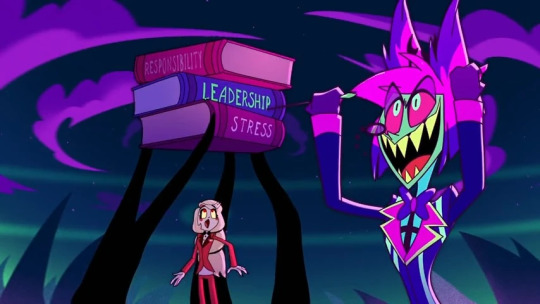
And heart (Lucifer):
Lucifer: Others say that in your needy hour
There's no substitute for pure angelic power!

So, Lucifer and Alastor can fight all they want, but in the end they are both needed by Charlie:
Lucifer is linked to dreams and ideals. He is the legacy Charlie inherits and the biological family she wants to re-connect with. Finally, he is Charlie's guide to Heaven, as he sets up her meeting with Sera and Emily.
Alastor is linked to fear and the unknown. He is the ally Charlie finds by herself and the found family she chooses. Finally, he is Charlie's guide in Hell, as he introduces her to Rosie and helps her inspire the cannibals.
LUCIFER: DEVIL AND ANGEL
Lucifer's arc in Dad Beat Dad can be summarized by juxtaposing Hell's Greatest Dad with More Than Anything.
Hell's Greatest Dad focuses on how Lucifer is the "Big Boss of Hell himself":
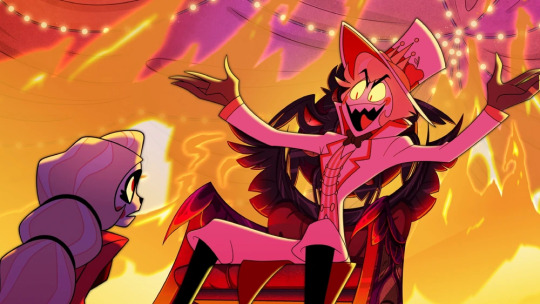
The lyrics reference pacts with the devils, pentagrams and sacrificial lambs:
Oh, with the punch of a pentagram
I wap-bam-boom, alakazam
Usually, I charge a sacrificial lamb
But you get the family rate (thanks dad!)
And the music plays homage to The Devil Went Down to Georgia, with Lucifer playing the Devil's famous golden fiddle:

At the same time, Lucifer is very self-centered throughout the whole song:
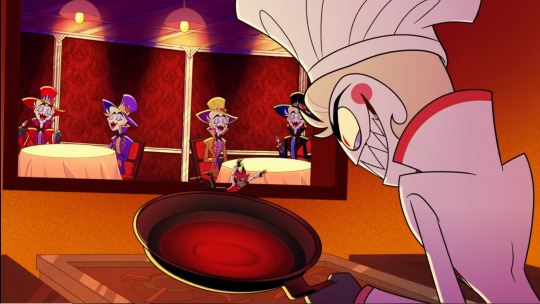
He keeps self-duplicating, as he himself sings how great he is. This ties with the fact he is trying to project an image of power and confidence. He is hiding under a metaphorical rug all his insecurities and flaws. He is repressing the shadow.
However, Charlie doesn't really want the Devil. She needs the Fallen Angel. It is this side of Lucifer that comes out in More Than Anything:
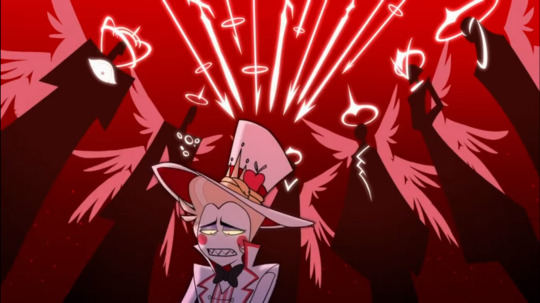
This song explores Lucifer's past as an angel and the pain of his fall. All things he tries to hide out of shame. Still, he shares them with Charlie together with his most genuine self. By doing so, he acts selflessly and puts Charlie's needs and wishes above his own. He puts his daughter at the centre of the scene:
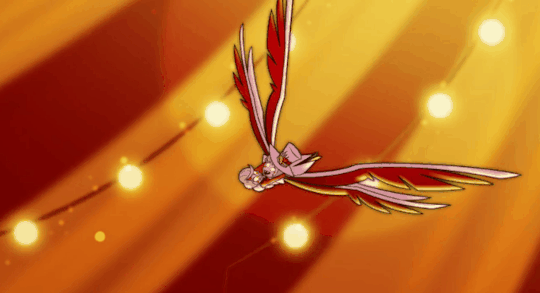
Lucifer shows Charlie his shadow, which actually makes his light stronger:
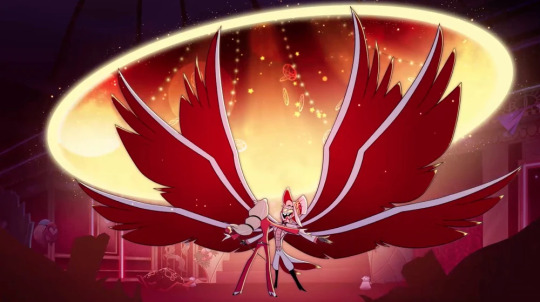
In Dad Beat Dad Lucifer goes from Hell's Greater Dad, where he is linked to fire and demonic symbolism, to More Than Anything, where he is characterized by light and angelic imagery. From want (Champagne fountains, caviar mountains) to need (I'll support your dream whatever lies in store).
ALASTOR: GROUNDWORK
Alastor's part in Hell's Greatest Dad is similar to his role in Stayed Gone. Both times, a powerful demon is singing his song, only for Alastor to come and throw off their groove. Still, there are some differences:
In Stayed Gone, Vox is focused on Alastor to the point his whole performance is a cry for attention from the Radio Demon. Alastor in fact has central stage, as Vox sings about him and to him. In Hell's Greatest Dad instead Alastor is an afterthought. Lucifer is singing to Charlie with some occasional backhanded insult to the Radio Demon. Basically, in the first song Vox is looking for attention. In the second, it is Alastor himself, who wants to be looked at:
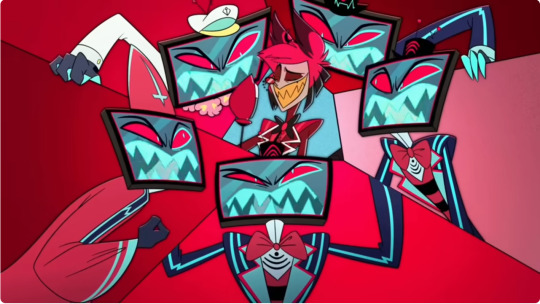
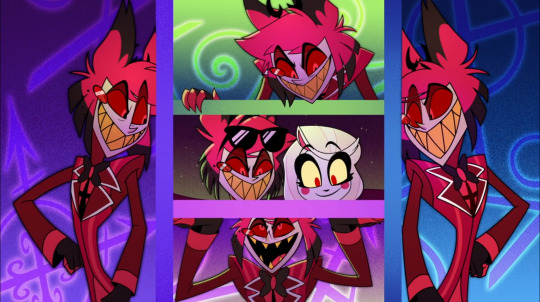
In Stayed Gone Alastor easily takes control of the song and by the end he dominates it. In Hell's Greatest Dad Alastor fails to do the same. Not only Lucifer puts up a fight, but by the end Mimzy arrives and steals the stage. This difference mirrors Alastor's spiral throughout the season. He starts wearing a mask of control, but slowly he reveals himself as controlled. This progression is shown in his songs. He dominates Stayed Gone, he fails to take over Hell's Greatest Dad and he loses his control in the Finale:
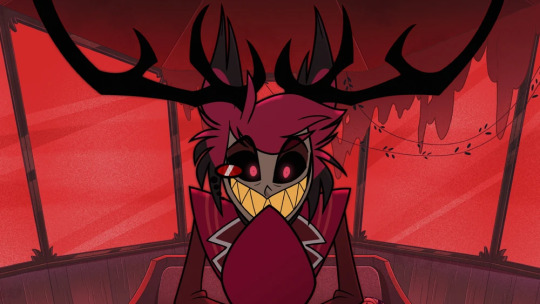

At the same time, both Stayed Gone and Hell's Greatest Dad set up important plot-points in Alastor's arc. On the one hand Vox's song implies him and Alastor have some unfinished business. On the other hand Lucifer's song foreshadows some deeper conflict going on between Alastor and the King of Hell. What is more, the song frames the Devil and the Radio Demon as intertwined characters.
This last point is made clear by both Dad Beat Dad and Hell's Greatest Dad referencing the Pilot multiple times.
1-Hell's Greatest Dad references Inside of Every Demon is a Lost Cause in three ways:
Alastor changes the surroundings by using neon lights, like in the Pilot
Alastor dances with Charlie in the same spot they dance in the Pilot
Lucifer summons a slot machine, like Alastor does in the Pilot
2-Both in Dad Beat Dad and in the Pilot, Alastor is trying to win Charlie's favor and to steal her away from a loved one. In the Pilot he does so with Vaggie, whereas in the episode, he gets in Lucifer's way.
3-Both the Pilot and Dad Beat Dad have a character explain Alastor's backstory:
Vaggie: He began to topple Overlords who have been dominant for centuries. That kind of raw power had never been harnessed by a mortal soul before. Then, he broadcast his carnage all throughout Hell just so everyone could witness his ability. Sinners started calling him "The Radio Demon" (as lazy as that is). Many have speculated what unimaginable force enabled him to rival our world's most ancient and destructive evils.
Mimzy: He appeared in Hell suddenly, making a splash quicker than anyone had ever seen. At first, people wanted to dismiss him. but soon, overlords started going missing, and not small ones neither. We're talking heavy. hitters. No one knew what happened to 'em, until these strange radio broadcasts started going out. All you could hear were screams. Every time an overlord went missing, there'd be a new voice screaming in the broadcast! That's when Alastor revealed himself as the radio demon, and anyone that would mess with him… well, let's just say, his broadcasts never lacked new voices.
Why are there so many connections between the two episodes? It is to cement Lucifer and Alastor's foiling. For example, it is telling Alastor gets major focus in Lucifer's debut episode. Not only that, but all these calls back reveal their bond has been prepared and foreshadowed since the pilot:

Alastor looks at the Morningstar Family's portrait and narrows his eyes in the Pilot.
This is why the Pilot itself is full of phrases Alastor says that are given to Lucifer in the series proper:
Alastor: Well, I'm starved! Who wants some Jambalaya?
Lucifer: Sooo.... Who's up for pancakes?
Alastor: Yes, sir! This is the start of some real changes down here! The game is set! Now… Stay tuned. Hahaha…!
Lucifer: Come on, little lady, why the frown?
In the last 10,000 years
You're the first one to change this town!
Alastor: After all, the world is a stage and the stage is a world of entertainment.
Lucifer: The stage is wrecked, the crowd is gone
But by God, Charlie!
The show, it must go on!
Basically, the Radio Demon and the Devil are incredibly similar, to the point that they convey the same ideas in opposite ways. In particular, the Pilot tells us what their shared arc is gonna be:
Alastor: Hahaha, why does anyone do anything? Sheer, absolute boredom! I've lacked inspiration for decades. My work became mundane, lacking focus, aimless! I've come to crave a new form of entertainment! Hahaha!
Alastor and Lucifer are at their root two artists who are uninspired and find new drive (for different reasons) in Charlie's big lofty dream. The ways they will approach this journey and where their foiling will go is left to be seen.
FORESHADOWING
Hell's Greatest Dad has some foreshadowing for The Show Must Go On:

This frame and Lucifer's line about him charging sacrificial lambs for his help hint at how the final battle is gonna go. Dazzle, who plays the sacrificial lamb in the song, dies, which frees Lucifer from his pact with Heaven. As a matter of fact Lute kills a Hellborn, which goes against the rules, so Lucifer intervenes and saves his daughter. In short, Lucifer helps Charlie in exchange for Dazzle's life.
Here it is everything I can think of when it comes to this song! I hope you like it :) and thank you for the ask!
#hazbin hotel#hazbin hotel meta#lucifer morningstar#lucifer hazbin#alastor#alastor hazbin#my meta#dallina17#asksfullofsugar
35 notes
·
View notes
Note
favourite rwby's allusions?
Hi,
thank you so much for this ask! I love RWBY's allusions and talking about them is always a pleasure! So, I have currently 4 allusions I would call faves. I love many others too, but these 4 are kind of special for me:
Cinder Fall - Cinderella

Cinder's allusion is at the same time obvious and very layered. The key to understand it is Midnight (best written episode of the series imo). There, Cinder's fairy-tale gets inverted. She is a slave who finds her prince (Rhodes), but is ultimately failed and left in the darkness. At the same time, Cinder's background helps us read her allusion in the main storyline. As a matter of fact Cinder's story is about the cycle of abuse. She is stuck in it, so her fairy tale keeps repeating and won't have a happy ending until she interrupts the cycle. As a result we have:
Salem as a combination between the Evil Stepmother (Madame) and the Fairy Godmother (Rhodes)
Ruby as the Prince (a better version of Rhodes)
Emerald and Mercury as Cinder's slippers (the embodyment of the twin swords of her childhood)
Salem is the Evil Stepmom masked as a powerful Fairy Godmother, who gives Cinder a new pair of shiny slippers (the Maiden Powers). Still, they are only a tool to manipulate our Cinderella. Ruby is instead the Huntress who dances with Cinder and will save her with her personal silver slippers (her silver eyes). Finally, Emerald and Mercury are the two sides of Cinder, her two slippers who will lead the Prince (Ruby and RWBY) to her.
Key to understand the allusion- The episode Midnight (+ the Beacon Dance tbh)
Favourite motif- Emerald and Mercury as the slippers
Why it is a fave- It balances its relevance to the plot with strong imagery and metaphors. So, it is easy to notice, but it leaves much to discover once you start analyzing it
Weiss Schnee - Snowhite
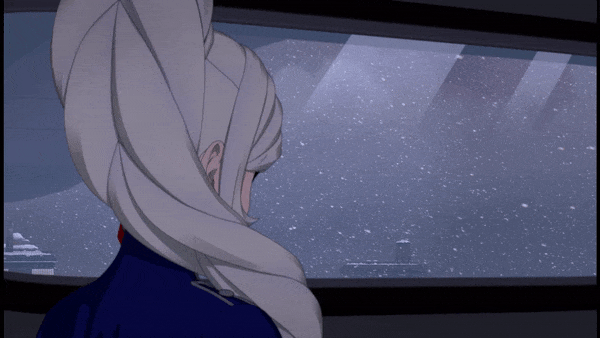
Weiss's allusion plays with the idea of "royal test":
White is cold and always yearning, burdened by a royal test.
Which is nothing, but a trial to see if Weiss is fit to become Queen. In fairy-tale symbolism, a princess becomes queen when she grows up and self-actualizes. So, Weiss's story is one where she blooms into herself. Initially, she is given two opposite examples of "queens":
Jacques is the Evil Queen of Snowhite
Winter is the Snow Queen of Andersen's story
Weiss's arc is about realizing she is neither. She is instead her own queen:
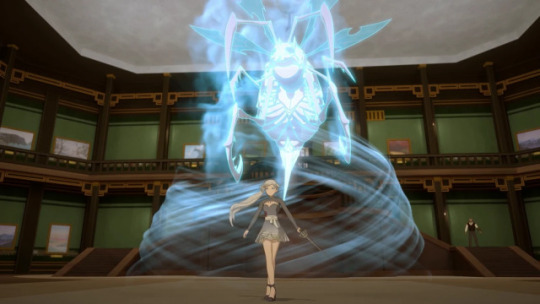
She does so through integrating the different characters of her fairy tale within herself. She is Snowhite, as such she is made of all the characters that make her story:
She risks to become an Evil Queen
She is an unsure Huntress
She is the Prince who saves herself
She is Snowhite, who grows into a Queen
All these sides are expressed through her summons:
The Queen Lancer is the Evil Queen who gets dethroned by the Good Queen (Snowhite) in the end
The Boarbatusk is the Hunter who kills a boar to help Snowhite
The Knight is the Prince who saves Snowhite
The Nevermore is the crow turned into dove, which announces Snowhite's final resurrection
So, the summons are different characters of Snowhite. Moreover, each character fits a different Jungian Archetype:
The Queen is the Persona (the mask she wears)
The Hunter is the shadow (what she represses)
The Prince is the animus (the masculine inside the feminine)
Snowhite is the self (the sum of all other archetypes)
In short, Weiss plays all the characters of her story and her semblance is used to metaphorically comment her arc and tie her fairy-tale to the main plot in a symbolic way. It might seem Weiss's story isn't following Snowhite's. Still, if one focuses on Weiss's inner journey it turns out she has already gone through the majority of the Grimms' fairy tale. Only a finale is missing, which I think will crown Weiss's arc with an apple. (I need an apple)
Key to understand the allusion- Weiss's summons are Snowhite's characters
Favourite motif- Snowhite's characters fitting different Jungian Archetypes
Why it is a fave - It is very Jungian and psychological. Weiss's Snowhite loosely follows her journey in Remnant, but really shines when it is applied to Weiss's internal evolution
Yang XiaoLong - Goldilocks and the Three Bears
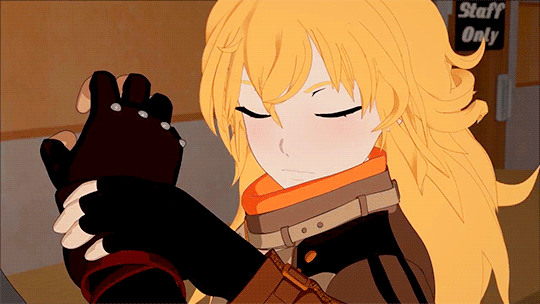
Yang's allusion is built on the idea of hot, cold and just right, which is declined in three different ways:
Red is hot, blue is cold and purple is just right. These colors comment Yang's arc and semblance. In particular, she is usually the just right (purple eyes), but when she uses her power she becomes too hot (red eyes)
Ruby is red, Weiss is blue and Blake is purple. This makes them Yang's hot, cold and just right. Together, they are the three bears of the fairy - tale, who welcome Yang in their found family
Yang is going through a process to find her just right. Still, before she succeeds she has to go through the too hot and too cold. In particular...
The Vale's arc is Yang's too hot:
Yang: Strawberry Sunrise. No ice. Oh, and one of those little umbrellas.
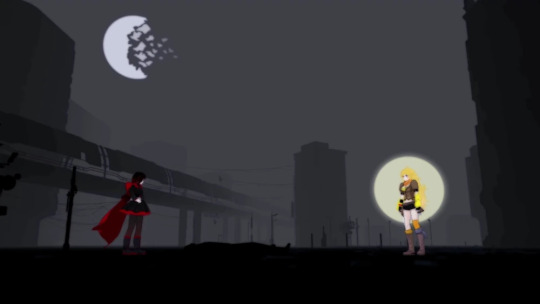
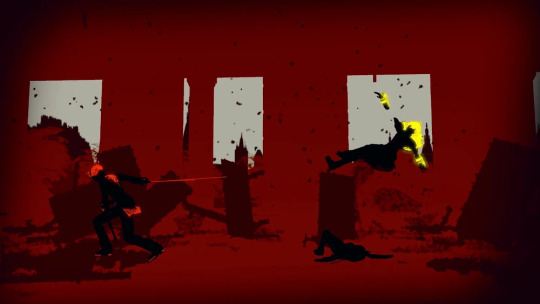
Yang goes to look for Raven and orders a hot beverage (no ice). She ends her search by finding Ruby (her hot bear). At the end of the arc she explodes in flames and loses an arm.
The Mistral's arc is Yang's too cold:
Yang: A water. It's hot out.
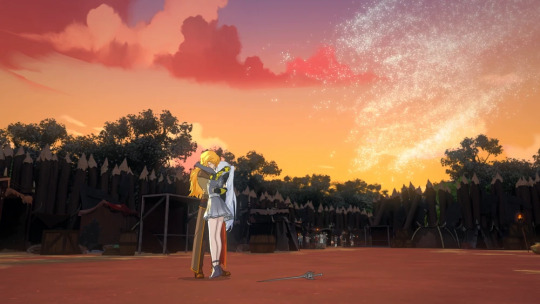
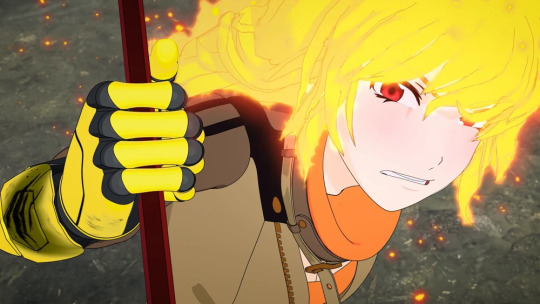
Yang goes to look for Raven and orders a cold beverage. She ends her search by finding Weiss (her cold bear). At the end of the arc she keeps it cool while fighting Adam and wins.
After this process, she has found her just right:
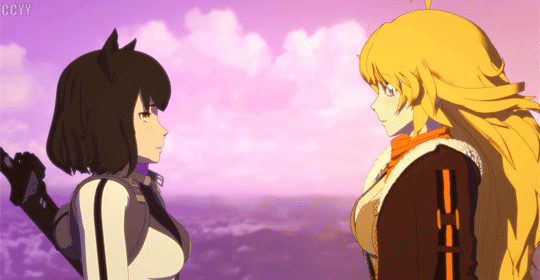
Still, I am sure Vacuo will explore this idea further and lead Yang's to her finale and truest "just right" as a character.
Key to understand the allusion - The Yellow Trailer sets up the metaphor with its different layers
Favourite motif - Red, blue and purple as hot, cold and just right
Why it is a fave - It uses dialogues and lines as motifs much more than other allusions and I find it neat. Especially because Yang is pun-girl and linked to knowledge, so I think this choice fits a lot.
Emerald Sustrai - Aladdin
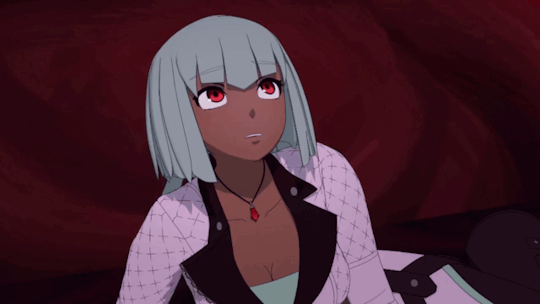
Emerald's allusion is one that caught me off guard and now I love it! The key idea is that Emerald is both Aladdin and the Geenie. As a matter of fact Cinder tricks Emerald with the promise to fulfill her wish only to turn her into a slave. In general, the key characters and motif in Em's allusion are:
Cinder and Salem as the 2 geenies that promise to fulfill Emerald's wishes
Cinder and Salem as the 2 Evil Wizards that abuse Emerald
The Cave of Wonders as the cycle of abuse
The Lamp (the Relic of Knowledge) and the Ring (Em's own semblance) as magical tools that help our Aladdin out
In general, Emerald's design and basic idea tie with Disney-Aladdin's famous line:
"Only one may enter here, one whose worth lies far within... the Diamond in the Rough" (Aladdin, 1992)
Emerald is a precious gem covered in dirt, but with time she will find her inner value and discover what she truly wants. As a matter of fact her allusion thematically explores the differences between wants vs needs. Emerald starts by following an illusory wish (Cinder), but is slowly realizing her true wish and need (RWBYJNRO and Mercury). Differently from others' allusions, hers is just at the beginning and needs some kind of climatic conclusion. I am looking forward to ti! (Bonus if it ties with Mercury's headcanon allusion I came up with :P)
Key to understand the allusion - Cinder and Salem playing the parts of the geenies while referencing respectively a ring and a lamp
Favourite motif - Emerald is a gem in the rough
Why it is a fave - I love the potential of how the geenies and the wish imagert can be used in Emerald and Mercury's arcs. It can be very very powerful!
These are my 4 faves, but of course there are other allusions I love! It is just I have analyzed them less, so it is as if I am lacking a full picture. They are:
Ruby's LRRH- I love how it is intertwined with the Alice's one in volume 9. Still, I think there is much more to it.
Penny's Pinocchio- It is one of the most powerful allusions tbh and I would like to analyze it properly one day. Its ending being an inversion of the original fairy-tale is perfect. Here it is Penny (Pinocchio), who creates Winter (The Blue Fairy).
Jaune's Jeanne D'Arc - The Jaunidice's arc sets up this allusion brilliantly. The way it ties Pyrrha with Jaune's inspiration and personal God and how it manifests itself each arc with a miracle Jaune witnesses or performs is very powerful.
I also like Blake's Beauty and Beast's allusion, but I did not have to discover it slowly and it came to me as pretty obvious. So, I like it a little less.
I have yet to think about Ren and Nora's allusions, but I am interested in them.
Finally, I am super interested in Mercury's allusion and I am curious about it. I think its set-up is great and I wanna see how it plays out.
Thank you for the ask!
#rwby#once upon an allusion#cinder fall#weiss schnee#yang xiao long#emerald sustrai#rwby chain of faves#my meta#asksfullofsugar#anonymous
59 notes
·
View notes
Note
you wrote such a beautiful rwby analysis but unfortunately I think you put more thought into the plot than the entire writers room
Hi!
Thank you, I am happy you found my analysis beautiful!
That said, I am sorry, but I disagree with your statement. It is fine if you dislike the series and even if you criticize it, but as for me, I think the writing is rather strong.
Here are some thoughts, which aren't really directed at you, but rather are born by me seeing a tendency going around where it is somehow "cool" to outloud state RWBY is badly written. I even saw people like... "apologizing" because they enjoy the series. Newsflash...RWBY is good.
RWBY is a series with a writing that goes from decent to very good depending on the moment. I would give it from 7 to 8.5 or even 9 in some scenes. More importantly, it is a story the writers are clearly enjoying writing, as for now. This is why I like watching it. It is genuine, upfront in what it wants to say and it takes risks. Ironically, a series with limited resources shows much more freedom in execution than many other stories, which are economically backed up.
I would also add people keep talking about good writing, but never really elaborate on it... And like, trust me, I do think there is good writing and bad writing. The problem is that people just take examples of "well written series" and decide a series written differently must be bad. This isn't really the case.
First of all, let's focus only on a specific type of story, which is the kind most modern movies, books and series are. This type of story is built on 3 (4) factors:
Plot
Characters
Themes
(Worldbuilding)
I would say the first 3 are more important usually, but there are some stories where the worldbuilding is so strong it becomes its own selling point.
Now, a good story is usually strong in all these departments. The perfect story is top notch in all 3 (4). That is because a good plot usually lets you develop the characters better, which in turns helps exploring the theme.
However, here comes the amazing truth... even the most incredible stories. Even the masterpieces loved by everybody... even them... end up choosing only 1 or 2 of these aspects and sacrifice a little bit of the 3rd (and 4th) one.
Naoki Urasawa's Monster? Its focus is themes. He chooses to go all out on this department, which is why the story is so powerful and resonates so much with people. Still, to do so, he chooses to sacrifice some parts of the plot to the point... some mysteries are not really solved. Some people may be annoyed by it, but I would not call it a flaw. It is a choice. Leaving some things open enriches the themes.
Death Note? If the story has to choose between characters, themes and plot, it goes for plot. This is why despite having so many well liked characters, it is difficult to think of outstanding character arcs in it. The same goes for the themes, which are only touched superficially. This is why btw Death Note is not a fave of mine, really.
Now obviously, many examples can be done and we could discuss forever on some because there is always always always a subjective component. What I am trying to say is... there are different ways to write a story. Not all people would like the same. Luckily, we have tons of stories.
Back to RWBY. I would say RWBY shines when it comes to themes. Characters and plot are good and interesting, but what keeps the story together, despite it playing so much with genre is that it has a very strong thematic core. You can't invent it or fake it btw. See, Death Note's author tries to do it in later works (Platinum End cough cough), but fails. At the same time, there is another department RWBY is top notch and that is symbolism. RWBY has a very rich symbolic system. Again... surely there are coincidences, but like this is a little bit too much...imho.
Now, does it mean, the writers came up with all the patterns I and others find? Probably not, but here is the thing... writing has an unconscious component. If you go earnestly at it, you are bound to unconsciously create patterns. A good writer is able to recognize them (either consciously or unconciously) and to capitalize on them. So far, I think CRWBY has capitalized on the patterns they created. I also think it is clear they are very good at researching and at playing with different sources by going deep into them. Again, you can't come up with the Ever After if you have not read and even studied Alice in Wonderland. It is just impossible. You would end up with a shallow and uninteresting copy cat. The Ever After isn't that because it is used to explore themes, characters and lore in an interesting way. Hence... ladies and gentlemen... it is a fruit of... good writing.
But really, since people are not commenting on it... I would like to point out that in 5 episodes of less than 20 minutes, they have managed to introduce a whole world, with its own lore, set of characters and main story (Alyx's) and to tie it to the protagonists' predicament in a way that hits really hard thematically and psychologically... To do that you need exceptionally thight writing... it is not that simple to do...
Anyway, have a nice day anon and consider watching something else. Thanks God the world is full of stories!
#rwby#asksfullofsugar#anonymous#rwby volume 9#rwby spoilers#btw obviously the story can still go downhill#this is possible for all stories#but so far i trust the writers#if that changes i'll let you know#i will add that messing up a story doesn't mean some parts of it aren't well written#see tokyo ghoul has still some of my favourite moments ever#but i still think it went downhill
210 notes
·
View notes
Note
So what are your thoughts on kana now having black holes in her eyes instead of a galaxy? and did you ever think we would ever get dark kana? because i was honestly surprised aka gave her that because i thought the dark eyes will be for the hoshino's only

I had not noticed, but you are right! Her eyes do look like black holes here...
In general, I think Dark Kana is necessary for Kana to grow and I am excited about this development. As I have written here:
If Kana wants to shine, she needs to experience shadows. If she wants to have healthy bonds with others, she needs to discover and accept their darkness. She is slowly going through this process.
I talk about others' darkness, but for Kana to start exploring her own shadows makes a lot of sense:
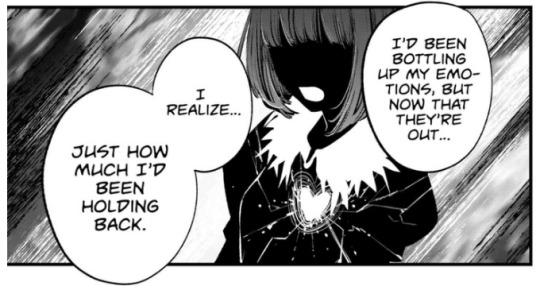
According to Jung, the shadow is what people repress and ignore, like Kana's negative feelings towards Ruby. These emotions are not only about Ruby, though, but rather they are about Kana's own acting career. As a matter of fact Kana's whole arc is about her rediscovering her own selfishness and need to shine:

As a child, Kana shines so brightly that she dazzles everyone. Still, she has a difficult personality, so she is left behind once she grows up. As a result, she matures and learns to work well with others, even if it means she has to sacrifice her own light for everyone's sake. Both Aqua and Akane notice this and try to help her shine again, in their own ways. Still, before Kana can truly explode in a bright galaxy, she should explore her darkest self and learn about others' darkness. It is not by chance that she starts this journey by trying Akane's acting approach:

Akane acts by looking inside. She analyzes her character and empathizes with her, so that she can become a new person and play naturally every part. Basically, Akane plunges into people's shadows with no fear. Kana here is doing the same. She is stepping into Nino's darkness and by doing so she is discovering new things about herself:

This is important on multiple levels:
Psychologically, Kana is facing the heart of her trauma. She faces her feelings of jealousy, which are the result of her low self-esteem born from the belief she isn't enough.
Plot-wise, she is becoming Nino, as Ruby is becoming Ai. Considering Nino is probably involved in Ai's death, it is possible Kana's link with Nino will lead to new discoveries.
Thematically, this movie is about understanding Ai, live her story again, but change its ending. From Ai's tragedy to the twins' happy ending. Nino and Ai's relationship could never be mended, while Kana and Ruby's will. Kana is right now surrounded by darkness, but she will escape them and shine once again. She will restore her friendship with Ruby and help her.
Finally, Kana's choice to show her true feelings to Ruby makes her similar to Ai:


In the end, Kana hurting Ruby is just an attempt to love her. Even when she is showing her friend her genuine negative feelings, she is doing so to help Ruby grow. Kana who never feels loved is right now trying to show love in the wrong way. Just like Ai is a person who was never loved and could not love. Kana is wrapping herself in a lie, just like Ai did. It is just that Ai's lie was "love", while Kana's one is "hate".
Kana is currently growing as an actress because she is experiencing lies and how complex and intertwined with truth they can be. It is not pretty, but it is necessary both for her art to bloom and for her to eventually be able to see the truth about her loved ones. Ruby, Aqua and Akane. Only in this way she can go back to shine brightly for them.
On another note, I wonder if instead Akane will grow in the opposite reaction by trying a more reactive and "bright" kind of acting. I think she should as she has many pieces of information that if shared could help save Aqua.
Thank you for the ask!
53 notes
·
View notes
Note
Could you analyse ‘Insane’ (the Alastor song by his original voice actor) with the added context of the show itself?
Hello anon!
Thank you for recommending the song, I had yet to listen to it!
That said, I don't really know if there is much to analyze, as the song was written before the series. It seems mostly a fun way to characterize Alastor. It gives you some vibes about who he is, rather than exploring his arc or giving hints about the future. In the end, it is pretty coherent with Alastor's superficial demeanor, which is rooted in his enjoyment of violence and power.

In any case, I would say the most interesting part is this:
Wait a minute, do I know you?
Weren't you an old pal of mine?
Departed from us far too early
But now we're meeting a second time
We used to have such fun together
And maybe you have what I need
But first, I have one tiny question
Tell me, do you demons bleed?
It might foreshadow some kind of future character since none of Alastor's current aquaintances fit. It is implied he meets Husk and Vox in Hell and the lines do not fit his dynamic with Mimzy. Of course, it might also be generic, but it is still interesting.
In general, I would say the main message of the song is that he likes Hell and refuses redemption, which is more or less what we learn about him from the pilot. It is also highlighted by Alastor's own reprise of Charlie's song:
Inside of every demon is a lost cause, ha
But we’ll dress 'em up for now with just a smile (Wicked smile)
And we’ll chlorinate this cesspool with some old redemption flair
And show these simpletons some proper class and style (Class and style)
Oh, here below the ground, I’m sure your plan is sound
They’ll spend a little time down at this Hazbin Ho—
What's interesting about the Radio Demon so far is that he doesn't really have his own song. Rather, he likes to "steal" others':
Alastor: Can you butt out of my song?
Lucifer: Your song? I started this!
As a matter of fact Alastor:
Takes Charlie's Inside of Every Demon is a Rainbow and twists it into Inside of Every Demon is a Lost Cause
Takes over Vox's Stayed Gone song and uses it against the TV Demon himself
Tries to make Lucifer's song his, but Mimzy comes and takes over herself
He also has small parts in other songs, where he sings unheard by the protagonist of the scene:
He sings with Rosie (and to himself) in Ready for This, while Charlie is distracted
He sings alone in the Finale, while the Hotel Crew is all together
Why is there such a stylistic choice when it comes to his character? The reason is quite simple. As I have discussed here, Alastor is everyone's Jungian Shadow. This means that he embodies what other characters repress. He is Charlie's fear to fail, Lucifer's sense of inadequacy as a father, Vox's unsolved feelings. So, he either takes over the characters' songs as they fail to face these hidden emotions or he sings unheard, because they are not even ready to aknowledge some parts of the self.
This also ties with Alastor's radio motif. After all, what is a radio if not a technology that "captures" people's voices and songs?
Mimzy: No one knew what happened to 'em, until these strange radio broadcasts started going out. All you could hear were screams. Every time an overlord went missing, there'd be a new voice screaming in the broadcast! That's when Alastor revealed himself as the radio demon, and anyone that would mess with him… chuckles well, let's just say, his broadcasts never lacked new voices.
Alastor grows in power by defeating Overlords and broadcasting their screams. So, he takes others' voices and makes them louder (in a bad way). In the series, he has a similar double role:
He takes over others' voices by hijacking their songs or twisting their messages
He makes and will make other people's voices stronger (in a good way). For example, he is gonna amplify Charlie's voice and message:
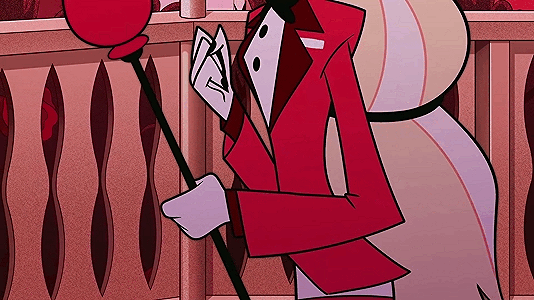
At the same time, Alastor himself uses the radio to hide his own voice, which is constantly filtered:
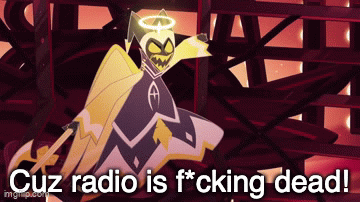
The moment his staff gets broken, Alastor shows his real voice, his real self for a short moment. His mask cracks.
So, Alastor not having his own song is actually much more meaningful for his character than having one. It shows how he likes manipulating others and their insecurities, so he doesn't have to truly show who he is:
Alastor: Just because you see a smile, don't think you know what is going on underneath. A smile is a valuable tool, my dear. It inspires your friends, keeps your enemies guessing and ensures tha no matter what comes your way, you're the one in control.
He is the radio demon, a jungian shadow who steals and twists others' music, so that he can hide his voice behind others' words.
In conclusion, I don't think the Insane song is very meaningful (I might be wrong or change my mind), but I think there is much to analyze in Alastor's lack of a song. Moreover, his parts in the song he invites himself are actually loaded with meaning. His foiling with Charlie, Lucifer and Vox tells a lot about Alastor, much more than any solo song :)
Thank you for the ask!
#hazbin hotel#alastor#asksfullofsugar#hazbin hotel meta#basically i will be happy to analyze other alastor's songs ;)
39 notes
·
View notes
Note
hey! Good day :) here to ask a question!! I was wondering about your process for analysis, character analysis, theme analysis- do you just write or are there specific things you look for? I suppose I’m curious if you have an idea/general gist of what you’re doing or steps you take to do your breakdowns. I’m trying to do something similar out of interest and your works are simply fascinating to read. I look up to your writing a lot!
hello!! Can I ask how you started analysing shows, how you went about it? I’m learning literary analysis and trying to do the same for hunter x hunter but I find it infinitely harder to analyse shows. Especially since I most notably consider diction in literary analysis lol
Hi!
Thank you for your nice words anon(s) and yay! I love meta-asks <3<3<3
So, it depends on the meta. In general, I try to focus on a specific topic, which can be:
a character (arc + foiling between characters)
a theme
the use of a specific motif, when it comes to a character or a theme
These are my three favourite kinds of analyses, but there are other types, as well. For example, some people are really into plot theories/predictions. Others prefer to focus on characters from a psychological viewpoint. Some other writers like to use philosophical lens or to compare different works. It really depends on your preference.
My preference is mostly for thematic analyses. This means that my character metas too tend to use a thematic lens. So...
WHAT IS THE THEME?
In short, the theme of a story is both:
the topic the story is exploring
the moral of the story, aka a phrase which summarizes its message
Stories explores topics through characters and plot, while the way the conflict is solved tells us the moral.
Some examples:
RWBY's main topic is humanity in both its weakness and strength and its moral is that victory is in a simple soul
Madoka's main topic is wishes and its moral is that it is worth to want things and to fight for them, even if it is painful
HXH is strange structurally, but its main topic is self-search, with its moral being that a person should not focus on the goal, but enjoy the journey
All of these messages and ideas aren't just things stated in dialogues (even if someone saying the theme helps). They emerge from the story itself.
RWBY's main conflict is about a destroyed world (remnant) surviving the anger of an evil witch (Salem). If humans let hate divide them, they lose. If they unite, they win. The main thematic question is then... can humans make the right choice? And the answer is that they can, as long as they remain simple souls (Ruby, but also Pyrrha at Beacon, Blake in Managerie, Yang in Mistral, Weiss with her family, JNR when they tag along and Penny in Atlas). The main message is that several people making the right choice leads to change. And that is humanity. This is why the characters keep being asked to give up their idealism and to embrace a more utilitarian way of doing things. And this is why every time they refuse and stick to their idealism. The conflict itself keeps testing their resolution.
Madoka's power system works through wishes, so the girls' powers and their backstories are all defined by their wishes and by how they relate to them. Madoka doesn't know what she wants. Homura's wish turns into an obsession. Mami makes a wish too early and thinks only about herself. Kyouko and Sayaka make a wish for someone else and have opposite reactions to their wishes ending poorly. Finally, it is revealed the girls' wishes are literally the force that keeps the world at balance. So, the plot, character arcs, conflict and worldbuilding are all about wishes.
HXH is made up of several arcs and each arc has its own theme. That said, the overall structure conveys the main theme. Gon's objective is to find Ging, but he keeps taking detours and getting engulfed in unrelated conflicts. However, the moment he meets Ging he realizes it is not his father who defines him, but rather it is all the people he met in his journey and his own experiences. Basically, HXH's strange structure conveys the main theme.
So, the theme (both topic and moral) should emerge by the characters, the worldbuilding, the conflict and sometimes even by the structure itself. In order to find it, one should start with the topic and ask themselves "What does the story really talk about?". The answer to this question will let you understand the theme as topic. The second step is to see how the story explores it.
DIFFERENT POINTS OF VIEW ON THE TOPIC
There are different ways a story can explore a topic. Still, the best stories have different perspectives clash with each other. Very often these different points of view are embodied by different characters.
Here are some examples, with some linked metas that explore the respective stories more in depth.
Madoka (topic= wishes):

Homura is determined to fulfill her wish no matter what
Kyubey is her opposite, as they are unable to wish since they lack feelings. This is why they need to recruit girls into creating energy through wishes
Madoka is in the middle, as she wants to wish for something, but doesn't know what
Mami, Kyouko and Sayaka all explore negative effects linked to wishes, which are connected to other secondary themes. Specifically, Mami explores the consequences of an immature wish, while Sayaka and Kyouko explore the selfishness/selflessness inherent in wishes
The conflict is solved through Madoka learning about the price of wishes, but still choosing to make a wish and to sacrifice her whole self for it. This ending conveys a specific moral: despite the pain and sacrifice that comes with them, wishes are still beautiful and worth it all. If Madoka had chosen to give up being a magical girl and had ended up the series without making a wish, the moral would have been the opposite: that a normal life is better than grandiose and dangerous dreams.
Monster (topic = the value of life)
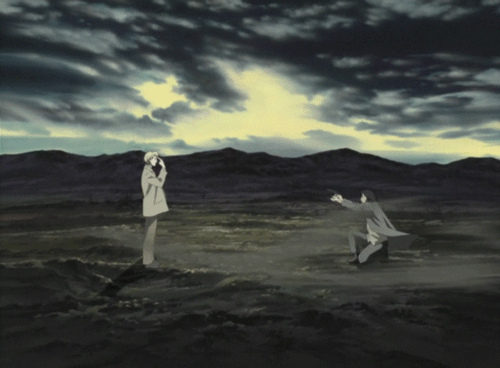
Tenma believes that all lives are equal, which is why he chooses to save Johan as a child, despite being ordered to operate a far more influential patient.
Eva and Nina believe that not all lives are equal. In particular, Eva thinks that social status and importance in society influence the value of one's life. Nina instead believes that people who commit crime should be punished and lose their lives.
Johan believes no-life has value, including his own. In his words, the only thing all humans are equal in is death.
Here, the moral is conveyed through the Tenma/Nina vs Johan's conflict. Tenma is tested in his beliefs, but ultimately does not abandon them and ends the story by saving Johan. Nina instead is asked to change her mind, as she ends the story embracing Tenma's point of view.
RWBY - The Atlas Arc (topic = trust)
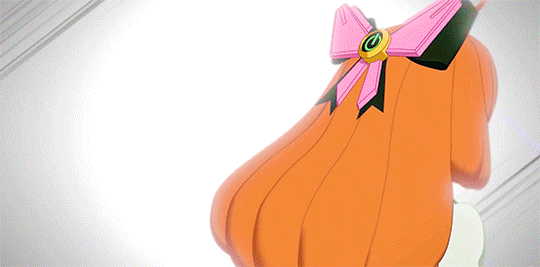
Ozpin lacks trust, as he is unable to trust others, no matter how loyal or dedicated to his cause they are
Ruby wants to "trust safely". She wants others, like Ironwood, to prove themselves to her before disclosing the truth to them
Ironwood is initially on Ruby's same page, but he spirals and comes to embody the "enemy of trust" aka control. He doesn't trust others, but wants to control them.
Oscar embodies trust, as he wants to trust Ironwood since the beginning. Even later on, he keeps on trusting people like Hazel and Emerald who are his enemies.
Cinder embodies another "enemy of trust", aka manipulation. She doesn't need to trust others to work with them, as she can use their feelings and wishes against them.
Penny embodies faith, which is a more extreme form of trust. She sacrifices herself and leaves the maiden power to Winter. She has no proof Winter will be able to save Weiss, Jaune or the relic, but she entrusts the future to her.
All these characters struggle with trust and its dangers. Some, like Ozpin, Ironwood and Cinder decide that trusting is too dangerous. Others, like Ruby, Penny and Oscar realize that to trust is the only way to move forward. Moreover, they learn there is not way to trust safely. As a matter of fact the moral of the arc is that "trust is a risk" and risks mean that things can end up badly. Still, not to take risk means to give up hope.
Hazbin Hotel - You didn't know song (topic= knowledge)
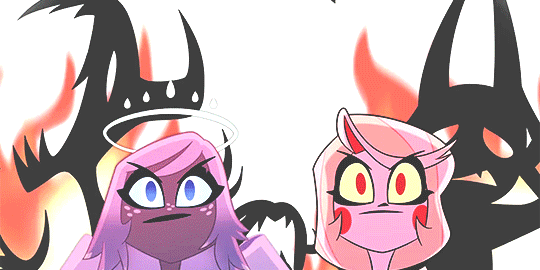
This song explores the idea of knowlege. The characters are after all in the middle of a questioning, which leads to several secrets coming out. Moreover, throughout it all the characters either admit or realize how ignorant they all are. The way they deal with this lack of knowledge establishes different thematic stances.
Charlie and Emily are both naive and ignore the darkest sides of their loved ones. Charlie doesn't know Vaggie used to be an exorcist and Emily has no idea Sera ordered the exterminations. Still, their answer to ignorance is to keep on questioning. They have no idea why only certain souls are admitted in heaven. Still, they think it is important to investigate the phenomenon and use it as evidence that there might be hope for the spirits in hell.
Lute and Adam don't know why some spirits end up in hell and others in heaven. Still, they do not bother to question it. So, Adam is caught by surprise by Charlie's question and has to improvise an answer. Not only that, but even later on the duo insist that Angel not being in Heaven proves he is unholy. And that's it.
Sera does know about the extermination, as she knows the system is unfair. Still, she refuses to question it and forbids others to do the same. She is the only one whose sin isn't ignornace, but knowledge.
There is no a clear thematic resolution to the question posed by the song. This is because the series is not over yet. However, the scene sets up the theme and the way characters will deal with it in later seasons will give us the moral.
As you can see, not only whole stories (like Madoka, or Monster) have themes, but also arcs (RWBY) and even episodes or scenes (Hazbin Hotel). That said, the way to go at it is always the same. Pintpoint the main topic and start investigate how the characters or the worldbuilding deal with it. You are gonna get several stances. The one which emeges victorious is the moral.
Let's highlight that the moral is not always embodied by the protagonist. For example, in the Madoka and RWBY's examples, Madoka and Ruby are initially at a loss and come to learn the moral by the end of the story (for Madoka) and arc (for Ruby). Similarly, Tenma initially does believe the moral, but doubts it throughout the story, only to be reminded and helped by other characters (like Nina).
In any case, the way the protagonist and characters in general relate to the main theme and to secondary themes is key for their arcs.
CHARACTERS AND THEME
When it comes to theme a character can either:
Believe the moral since the beginning
Not believe the moral since the beginning
In the first case, the character either stops believing the moral by the end (negative arc) or keeps believing the moral until the end (positive arc). In the second case, the character either learns the moral (positive arc) or doesn't learn the moral (negative arc).
In short, the story keeps challenging the character on their beliefs and they must either stick to their point of view or change it, depending if they believe in the moral since the beginning or not.
Exhibit A:
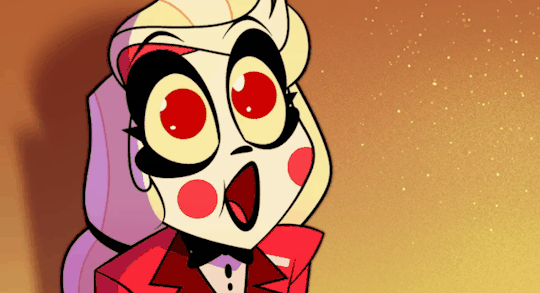
Charlie's belief that sinners can be redeemed is right. Still, in the beginning nobody else agrees with her, so she is challenged by the world around her. Her objective is not to lose faith in the Hazbin Hotel and to inspire others to change their mind too. Throughout her journey, she is bound to grow too. She starts as sheltered and naive with a simplistic idea of what redemption is. By the end, she will gain a deeper understanding of redempion and will grow as a result.
Exhibit B:

Eren's journey is about realizing what freedom (the main topic) is about. The problem is that he fixates himself on the idea that freedom means no boundaries, either natural nor humans. This leads him to embrace destruction and nihilism and to lose himself. In the end, the character who realizes what freedom truly is is Mikasa. She doesn't discard her bond with Eren, but is still able to make independent choices and to live as herself. In short, Eren doesn't learn the moral, hence why he spirals instead of growing.
Charlie is a protagonist who knows the moral and will grow with it in a positive arc. Eren is a protagonist who doesn't know the moral and never learns it. This is why he has a tragic negative arc.
These are just two examples, but there can be different combinations. By interrogating yourself on how characters relate to a theme, you get better a better understanding of their role in the story and of their overall arcs.
Still, how to find themes in a story? Luckily, each text is full of hints that are there for us to interpret them.
MOTIFS
Motifs are repetitive details within a story, which are used to communicate themes.
Anything can be a motif: a line, a musical tune, a specific imagery, an object. By repeating them in key moments throughout a narrative, they become symbols, which means they can lead to bigger metaphors and convey specific meanings.
In the song More Than Anything, dream is one of the main topics. We realize it because the characters keep mentioning it. At the same time, light keeps popping up. Lucifer summons light and throws it away, Charlie rememebrs a light show Lucifer imrpovised for her. Lucifer and Charlie start the song in the shadow and they end it in the light. This means that "light" is a motif throughout the song and by seeing how it is used we better understand the theme and the relationship between the two characters. We understand that light is a metaphor for dreams. Lucifer gives up on it, Charlie is inspired by it and eventually Lucifer summons it back as he has decided to believe in Charlie's dream. By looking at the way light is used, we can see that Charlie teaches Lucifer the moral that it is worth it to fight for dreams and not to give up on them.
In the CAA of HXH, gungi is a motif that comments both the topic of humanity and Meruem and Komugi's relationship. Their matches become a metaphor of monstrosity vs humanity, as humanity slowly conquers Meruem to the point he himself chooses to live and die as a human, rather than the King of the Ants. Similarly, Kokoriko symbolically becomes Komugi and Meruem's child, in the sense they give birth to this move and evolve the game.
Sometimes, their meaning is unique to the story. For example, gungi is a motif that makes sense within HxH and can't be brought outside of the series, as it is not a real world game. It only exists in that universe. Some other times, a motif can tie to bigger sets of symbols. For example, light and shadow are universal symbols that bring with them several additional meanings:
Good and Evil
The Jungian persona shadow
In the Hazbin Hotel song the first dychotomy doesn't fit, while the second one does. Initially both Lucifer and Charlie hide things from each other (shadow), whereas by the end they show who they are (light).
In short, to analyze a story, you should find its key motifs. They are hints to better understand the theme and the characters. Different stories will use different motifs and tie them to different wider sets of symbols. To find the right ones can help a lot in better understanding a story, as a whole.
Some examples:
RWBY uses fairy tales and alchemy as its main motif, so these two sets of symbols are the most useful to analyze the series
HxH is a shonen and uses its powers and fights to convey character arcs and themes, so to analyze one's nen abilities helps a lot
Hazbin Hotel is a musical series that takes inspiration from religion and mythology. So, it is probable that the best understanding of it will come from analyzing its songs and from looking into its religion inspiration
Of course this doesn't mean you should only use one motif to analyze a story. For example, you can use RWBY's semblances to look into the characters, as well. And there are some fairy tale allusions in Hazbin too. In the end, it is about using what best helps you understand a story as a whole.
What is more, there are general sets of symbols that can be useful in most stories, such as jungian archetypes. Finally, you might want to start from other aspects of the story itself, rather than theme or characters or plot. For example, you might be drawn to the world-building and realize it is used in a special way to explore the theme. Or you might be curious about character designs and see that they have their own symbolism (for example, I believe RWBY ones do and probably Hazbin Hotel ones, as well).
SOME PRACTICAL ADVICE
I have linked in the title of each paragraph, but this last one an article by @septembercfawkes. Her posts are great to better understand narrative structure and I found them enlightening.
I think the best thing you can do is to start with focused metas. Choose a scene, a character, a motif that intrigues you and start exploring it. It is better to start small and to narrow your focus, it would be easier to organize your article.
I usually outline the contents of the meta before starting to write it. Still, it sometimes changes as I keep writing.
It can be useful to write at the beginning of your analysis what you are gonna do. It will help you remember what the point of the meta is. For example, in my RWBY allusion meta or HxH nen meta, I always start with the motif I am analyzing. I summarize the fairy tale (even if many people know it already) and I explain what the character's ability is about. It helps organizing the flow and the contents.
The more you analyze the better you become at it, so it is just a matter of starting :)
Thank you for the asks, I hope this was helpful and not too much confusing!
Have a nice day!
43 notes
·
View notes
Note
Hi,.....if you don't mind me asking, can I ask your top 5 (or top 3) favorite characters from Hazbin Hotel? And why you loved them? And your top 5 favorite moments from the series? Sorry if you've answered this question before....Thanks....
Hi!
Thank you for this fun ask :D
FAVOURITE CHARACTERS
1- Lucifer
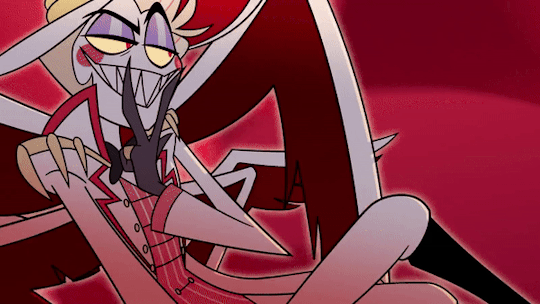
He's a disaster and I love him :''') He is very well written so far. He has a strong characterization, which combines a comedic side (bumbling dad + airhead) with more serious traits (depression). He is also set up to have a wonderful arc, which ties with important themes for the series, as a whole. Dreams, redemption, freedom and love. His relationship with Charlie is especially sweet: he is very very flawed as a parent, but through his daughter he finds hope again and makes some steps to grow. Plus, he is a mix between Barnum (the greatest show) and Walt Disney, which is very meta when it comes to the themes of creativity and enterteinment.
2- Charlie

Charlie is one of the rare protagonists I adore! She feels both classic (she is a Disney Princess) and original (she is the Princess of Hell). The premise to have such an idealistic character as a high profile demon is both hilarious and very strong thematically. Not only that, but Charlie's conflict is actually pretty deep and layered. On the one hand she genuinelly wants to help Sinners and is right about redemption. On the other hand she is also using her dream to run away from her problems and hide her self-issues. Charlie is deep down a child, who felt abandoned by her parents and who doesn't fit in her own Kingdom. The Hazbin Hotel is a home for both Sinners and herself. A place where she can stay for a while, find familial bonds and grow. On a writing note, I like how active she is. She drives the conflict beautifully in a way which is almost refreshing.
3- Alastor
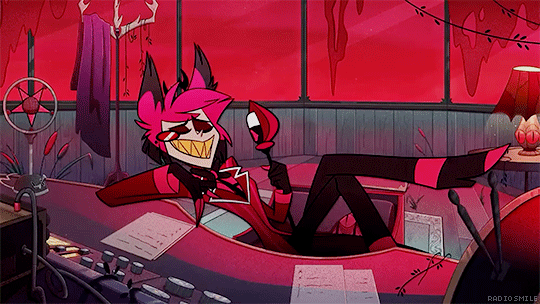
Here comes another disaster! Alastor is clearly the key character of the series, both when it comes to plot and to theme. He is clearly linked to Lilith's mystery somehow (either because he made a pact with her or because the reason of Lilith's disappearence ties with whoever Alastor made the pact with). He is also a challenge to Charlie in how she believes everyone can be redeemed, but Alastor will try very very hard not to be LOL. And he will probably fail :''') Apart from it, he is very well used in the first season. His mystery is built up and he manages to stay active and move the plot without taking central stage. In a sense, he stays in the shadows, which is fitting for a shadow character.
3- Angel Dust
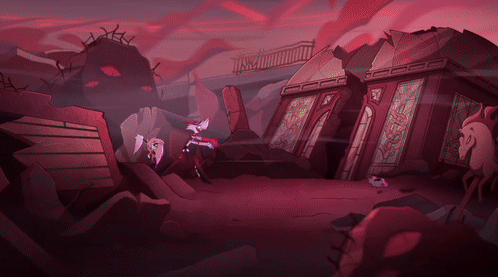
Angel is a sweetheart, who hides his feelings and goodness out of fear. I like his sibling bond with Charlie and how selfless he is towards his loved ones. His stay at the hotel isn't really about redemption, as Charlie thinks. Rather, it is more about healing, finding a stable environment and escaping a toxic relationship. I like his small step towards independence. His story is just beginning and his arc is just set up, but it has already the potential to be great.
5 - Adam, Sir Pentious, Vaggie, Sera (basically a bunch of characters LOL)
Adam is a villain I enjoyed immensely. He is just fun to hate LOL and I am curious to see if he will gain some depth. Either through coming back or post-mortem. I also like he is a play with School of Rock's Dewey Finn. He is in love with rock and metal and even uses rock rhetoric, like "Stick it to the man". Except that he embodies everything rock isn't. He himself is the man. He is a mediocre authority figure who uses his power against the weakest. Sorry Adam, but Charlie is way more punk rock than you :P
Sir Pentious is adorable <3 His arc is simple, but well done. I love how he slowly opens up to others and his crush for Cherri Bomb is adorable. I am curious to see where his story will go.
Vaggie has a very interesting premise in how she foils Lucifer as a fallen angel (and will probably foil Lilith, as well). The reveal of her background was great and I love her design and her focus in Hello Rosie, where she finds a mentor in Carmilla. Still, I want more of her and feel like her arc is just set-up as for now. It ties with trust, which is a great theme for a love story.
Sera has only appeared once, but I like her characterization. She is sympathetic, but also very clearly in the wrong and the main responsible for the whole conflict (yes, even more than Adam as she wields more power and could have stopped him). I like her bond with Emily and I am curious about her relationship with Lucifer, since what happened to him seems to have scarred her.
FAVOURITE MOMENTS (IN NO ORDER)
More than Anything - Charlie and Lucifer's confrontation
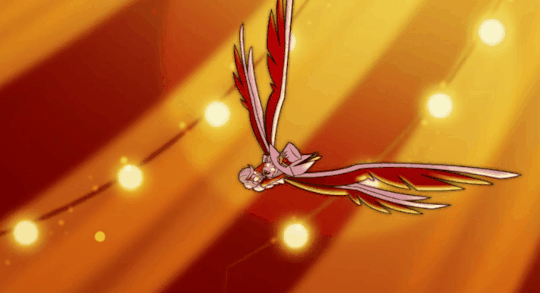
Charlie and Lucifer discovering each other and affirming their familial love is beautiful. Charlie reveals she still adores her father, despite his flaws and neglect. Lucifer finds in himself the drive to dream again.
You Didn't Know - The questioning
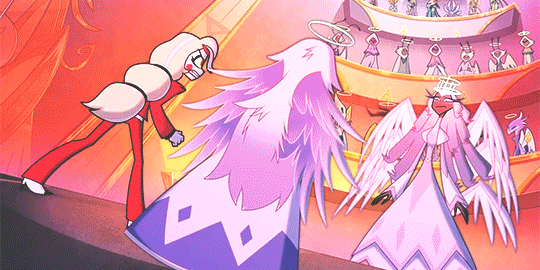
The whole courtroom scene is brilliant thematically. The main conflict goes from redemption for sinners to questioning the system. It is poignant how Lute and Adam are stuck in their heads and unable to either ask nor answers questions. Charlie and Emily instead keep interrogating others and themselves. They discover the reality around them is complex, starting with their loved ones (Vaggie and Sera). Still, these doubts will make them stronger in the end.
Lucifer's Big Damn Heroes moment
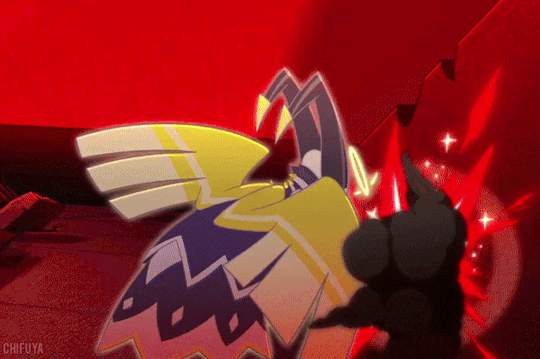
Lucifer joining the fight to save his daughter is a great conclusion to his arc this season. Plus, he manages to be both badass and hilarious at the same time :''') His short skermish with Adam is pretty funny, as well and it was cool to see his demon form. Plus, we got some more hints to whatever happened in Eden, which is bound to be important for the story as a whole.
Ready for this
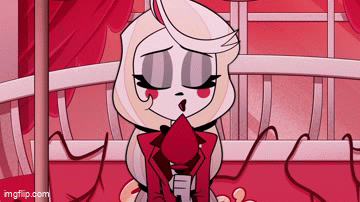
This is Charlie's big moment this season. It is when she realizes she can do this. She has within herself the strength to inspire people with her voice, just like Lilith. Rosie and Alastor encouraging her is great, as well. And the whole set-up with a town full of kind and cheerful cannibals is hilarious.
The Show Must Go On - The Finale
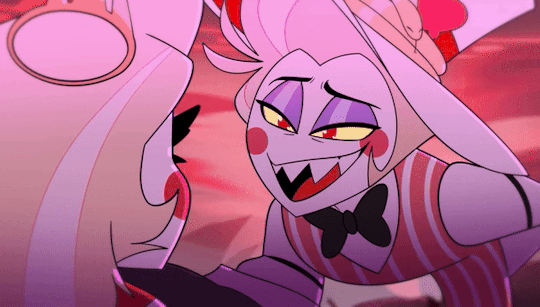
The final song is perfect as a conclusion to Charlie's journey this first season. She starts it by singing alone, with everybody dismissing her. She ends it surrounded by her loved ones, with everyone "singing her song". Lucifer and the whole Hotel Crew encourage her not to give up and help her re-build her dream. The hints to future plot-lines (like the Vees and Alastor) are also great.
#hazbin hotel#asksfullofsugar#chain of faves#lucifer morningstar#charlie morningstar#alastor#angel dust#dnana-2809-blog
25 notes
·
View notes